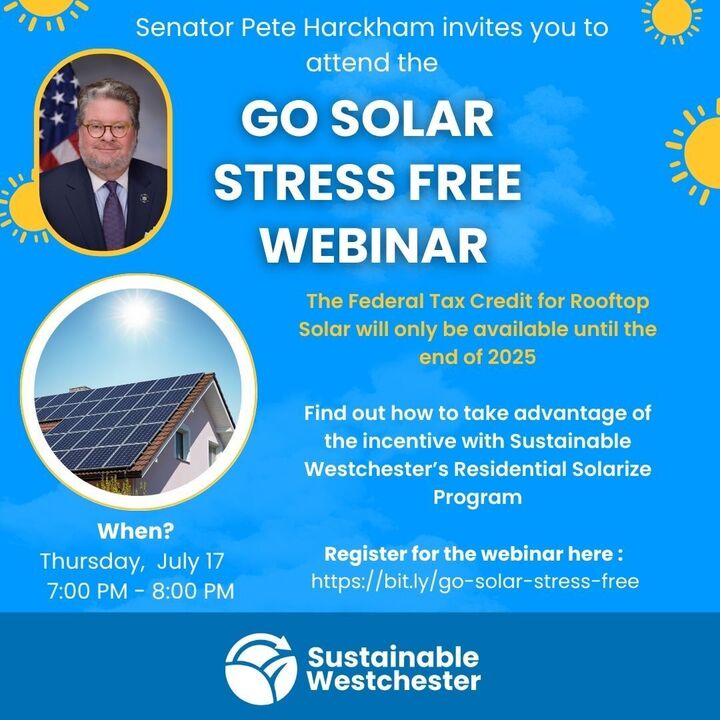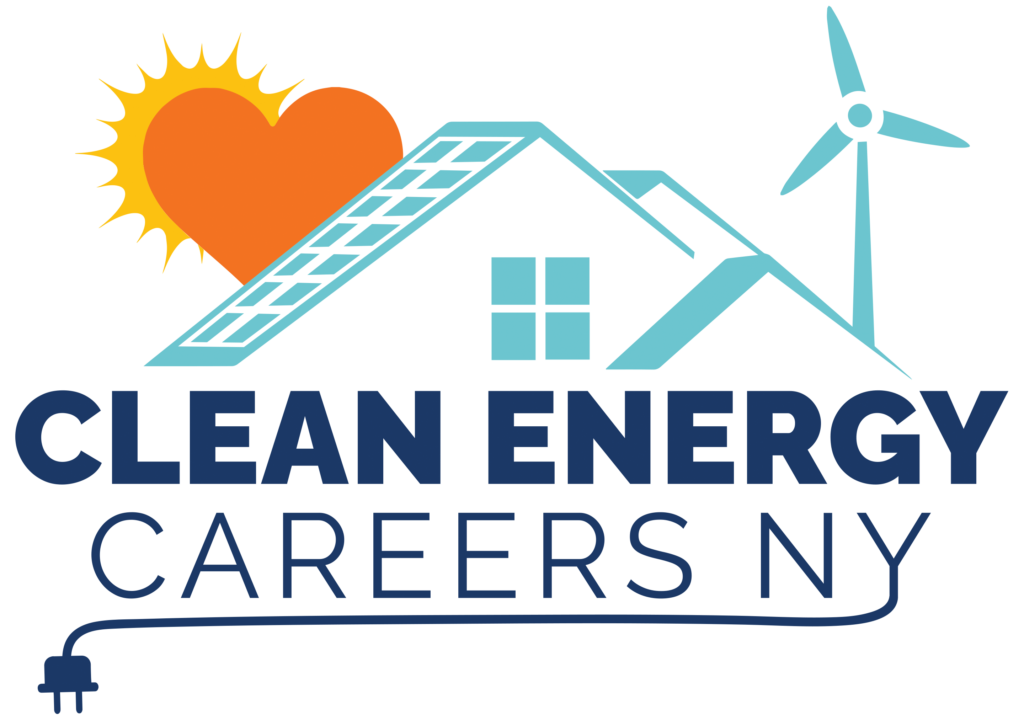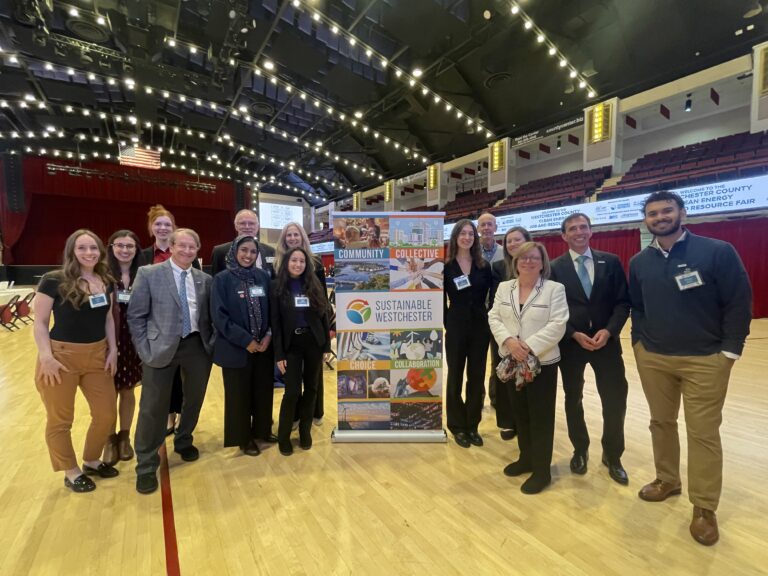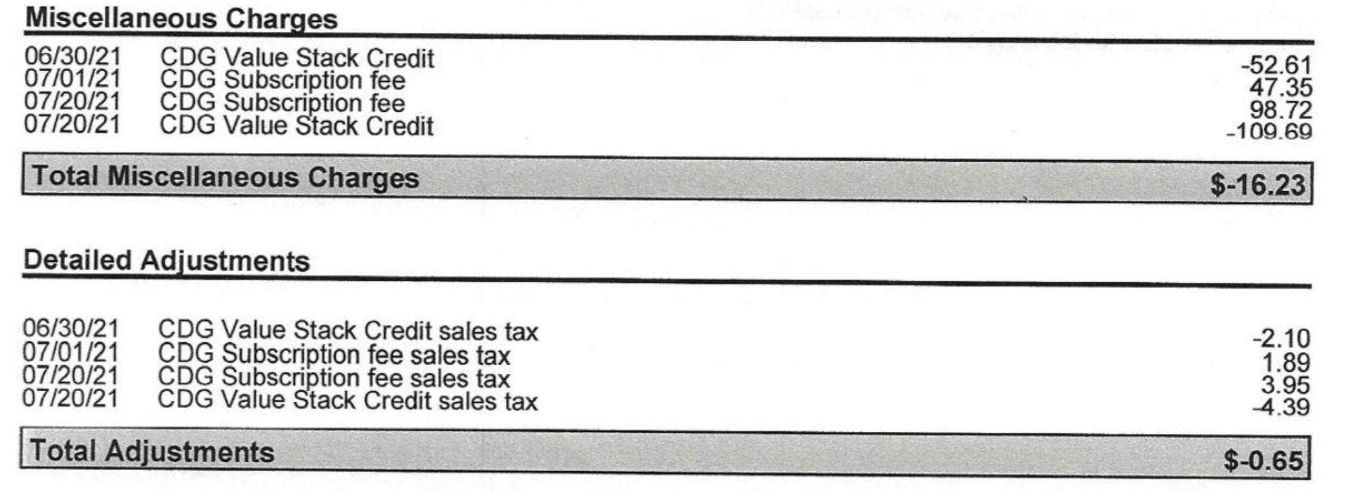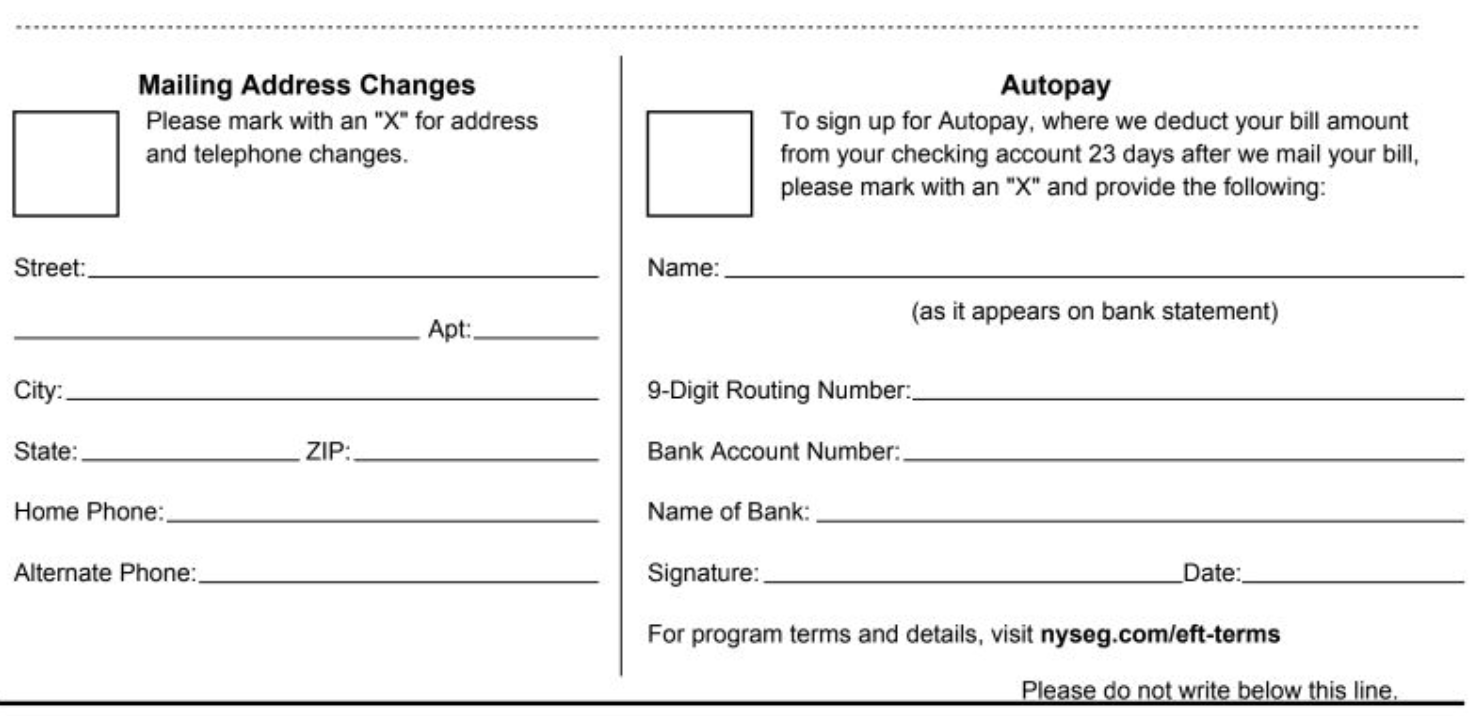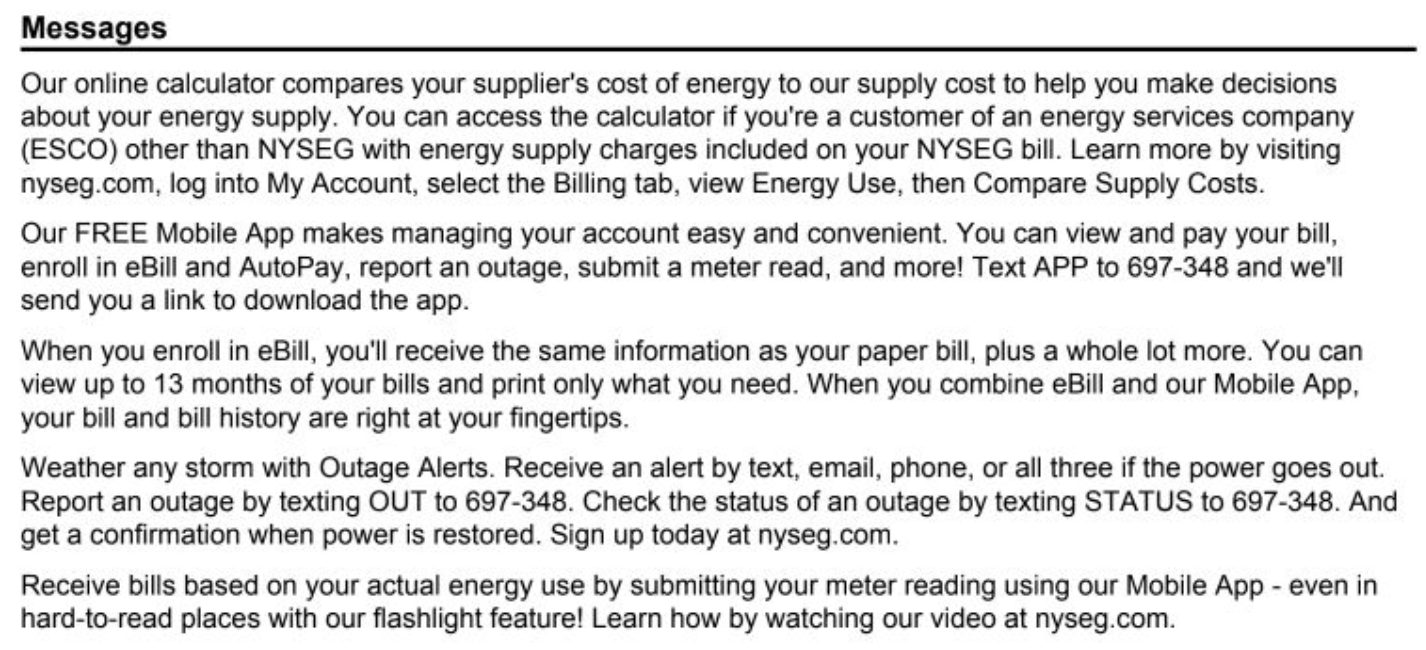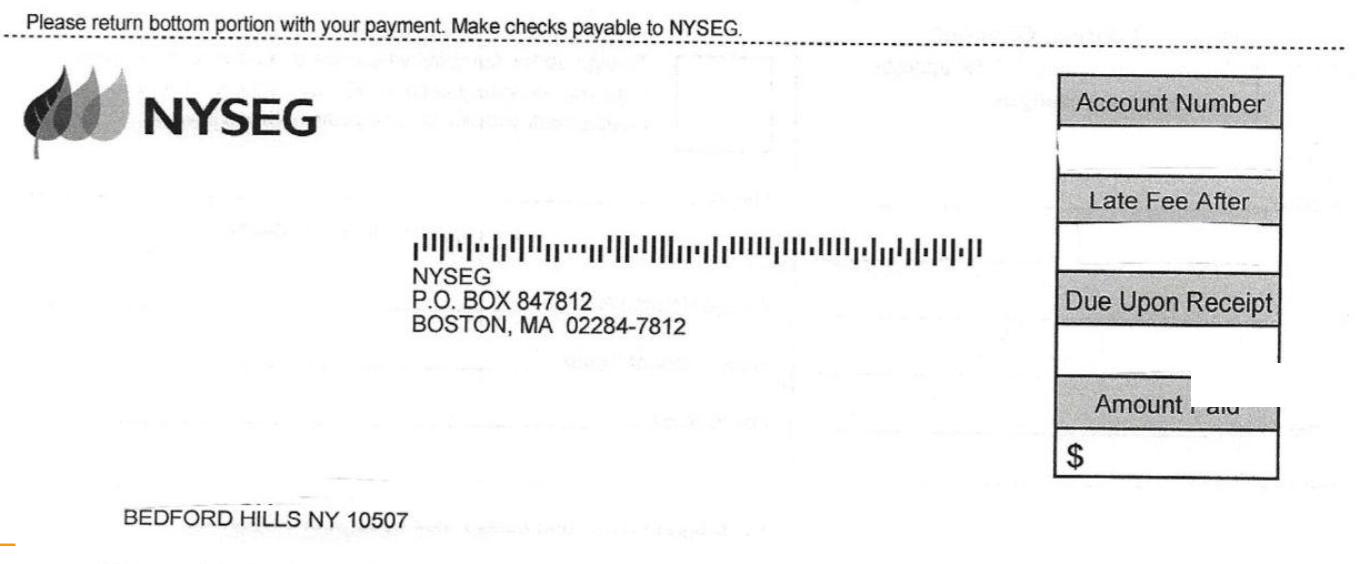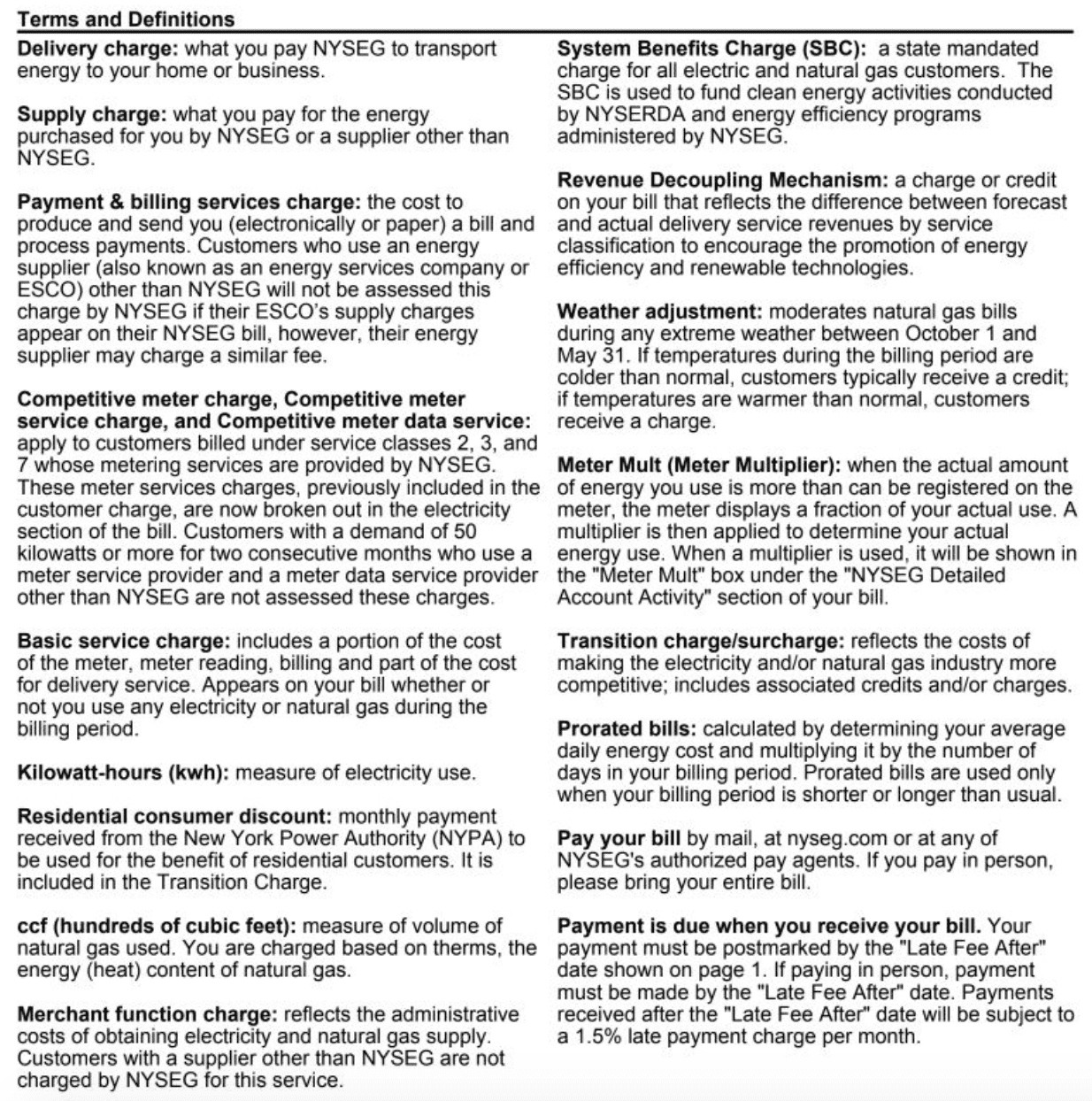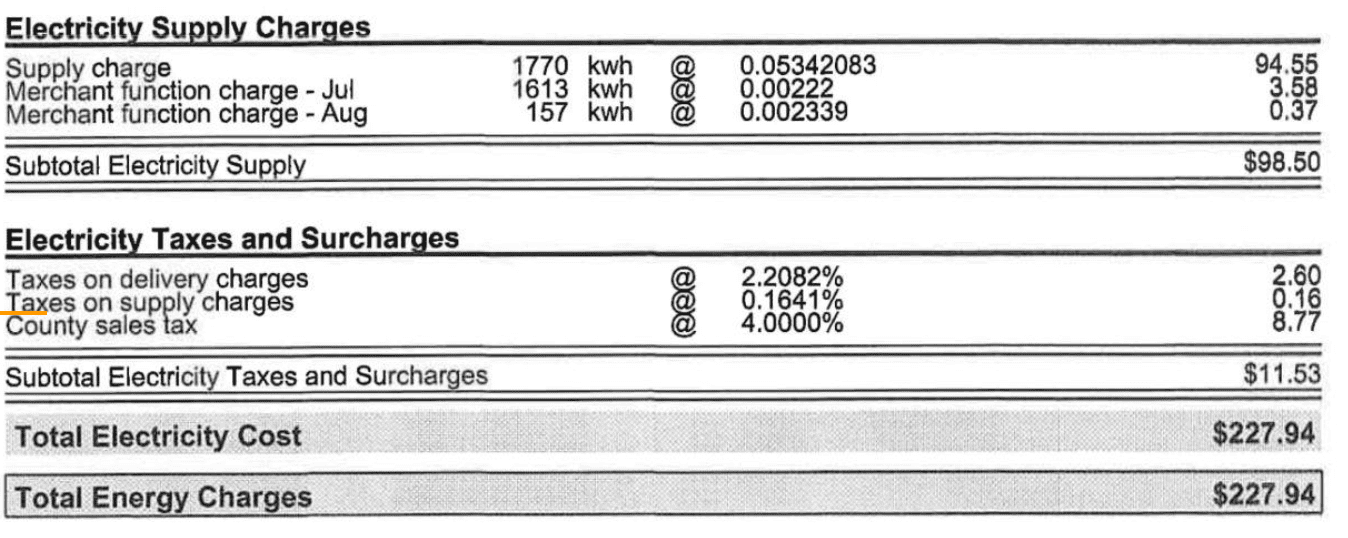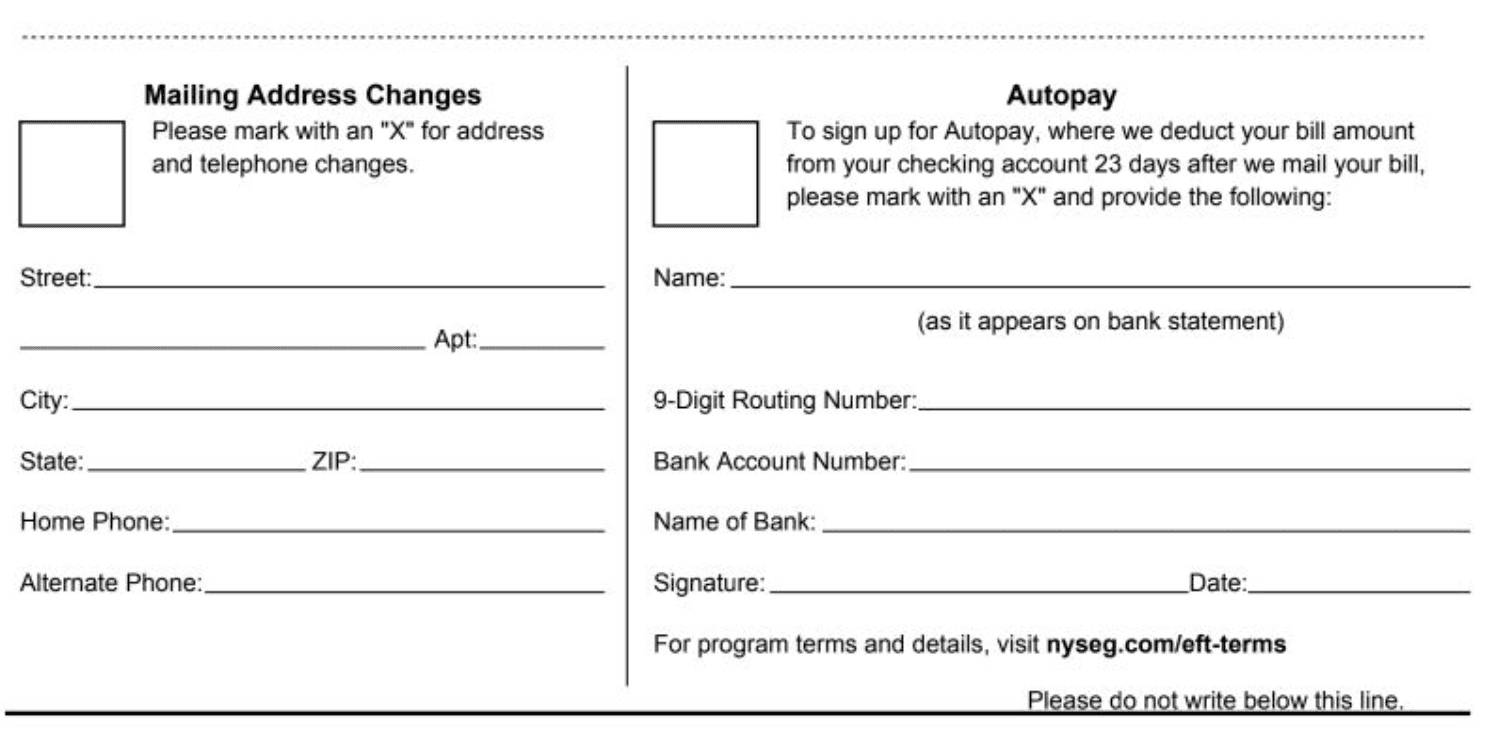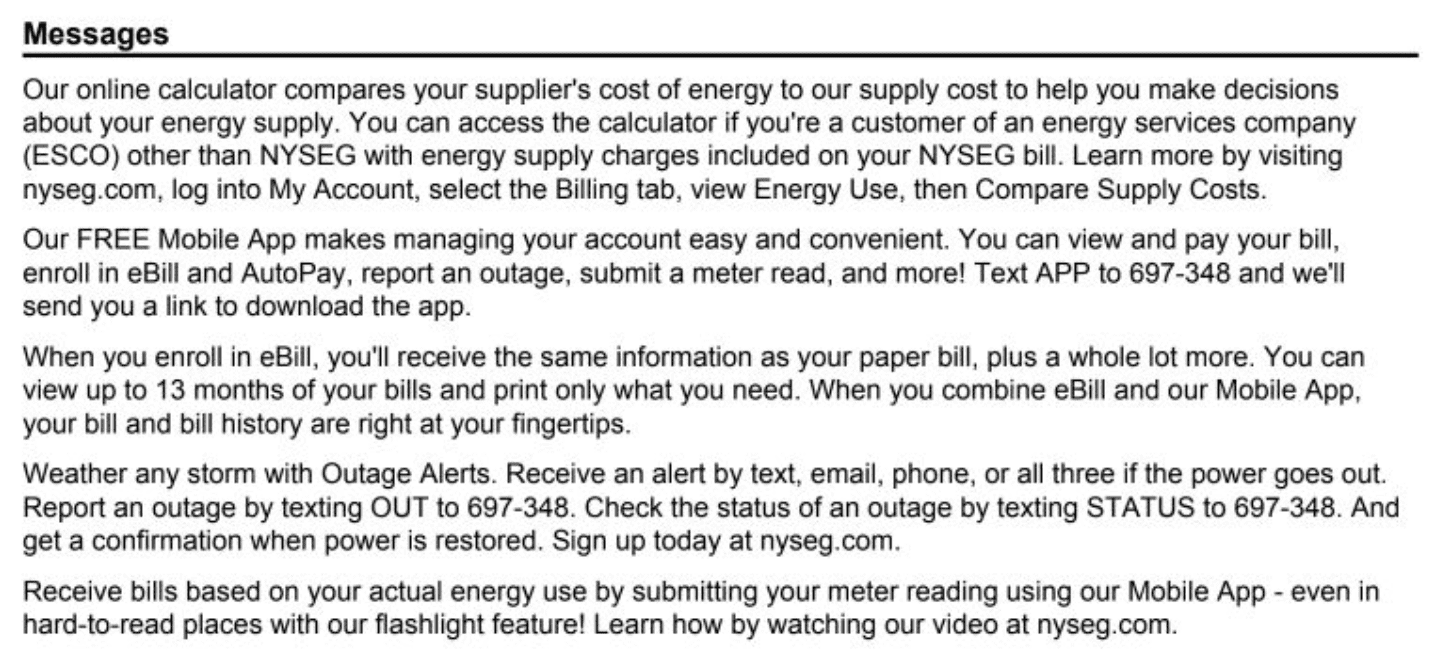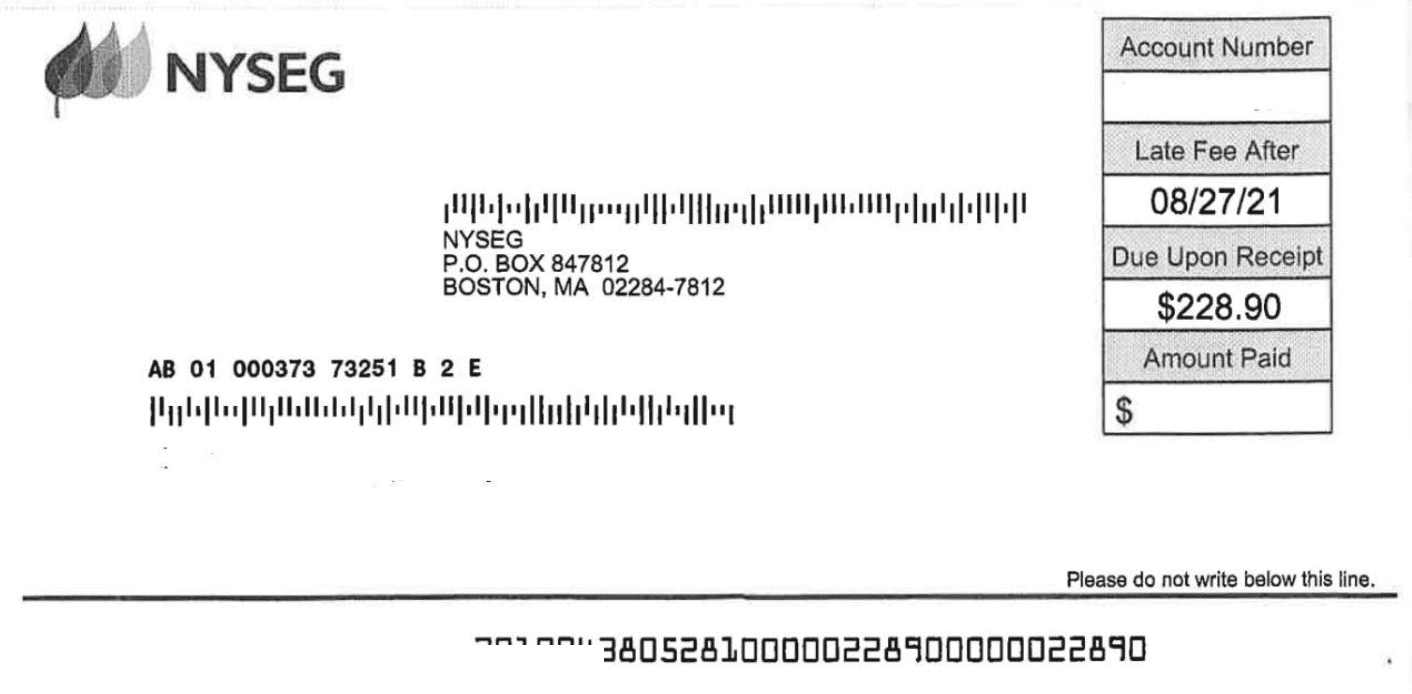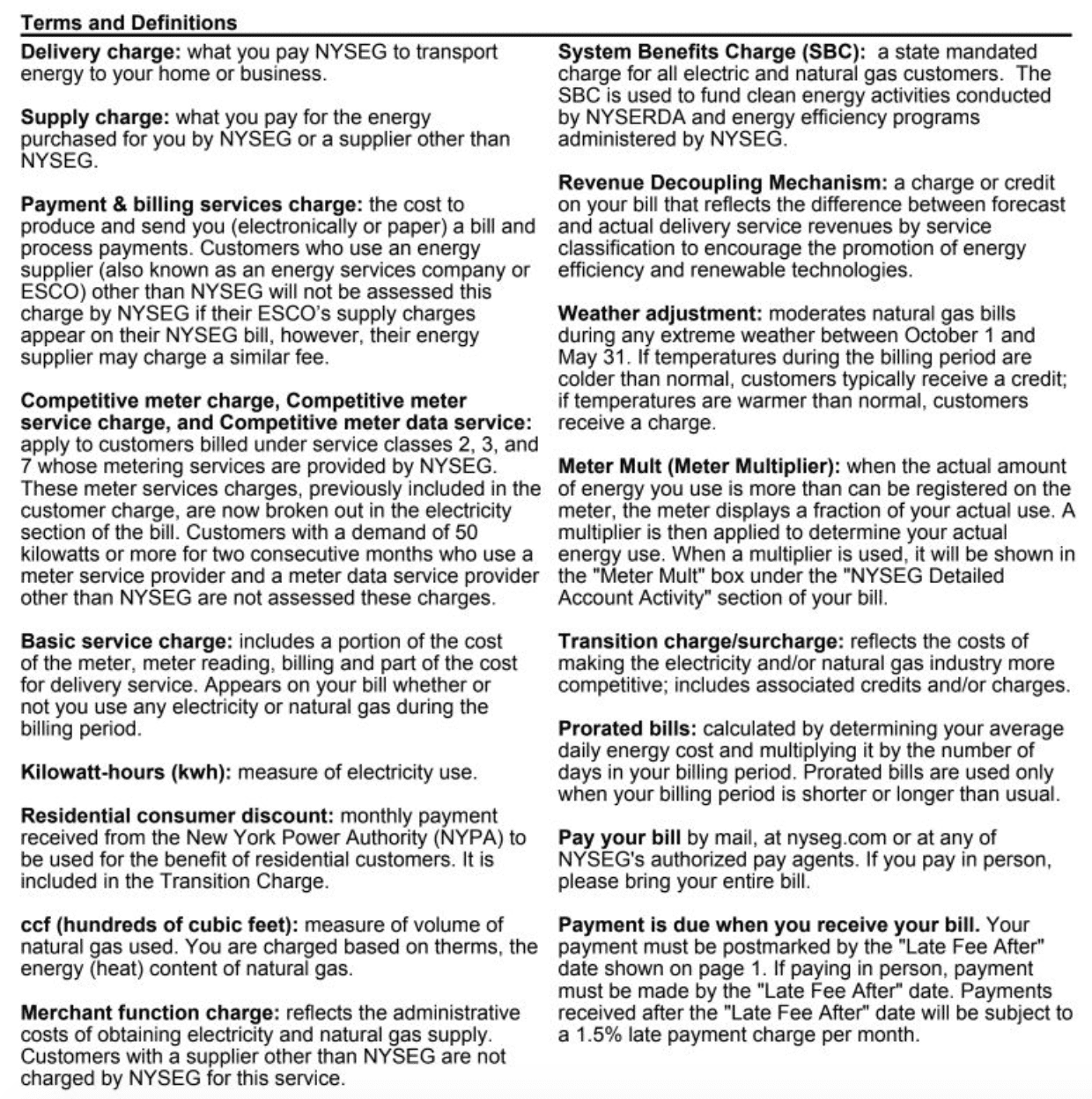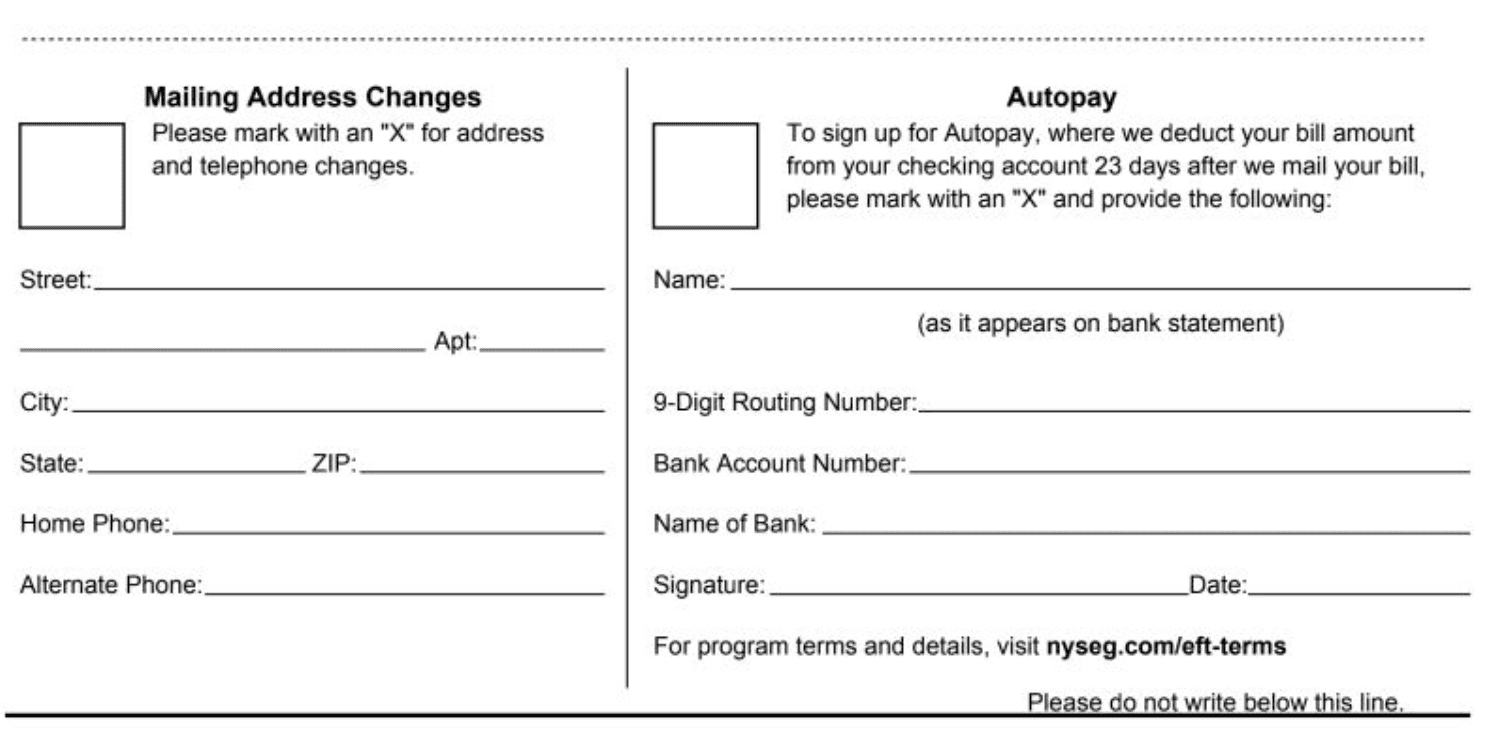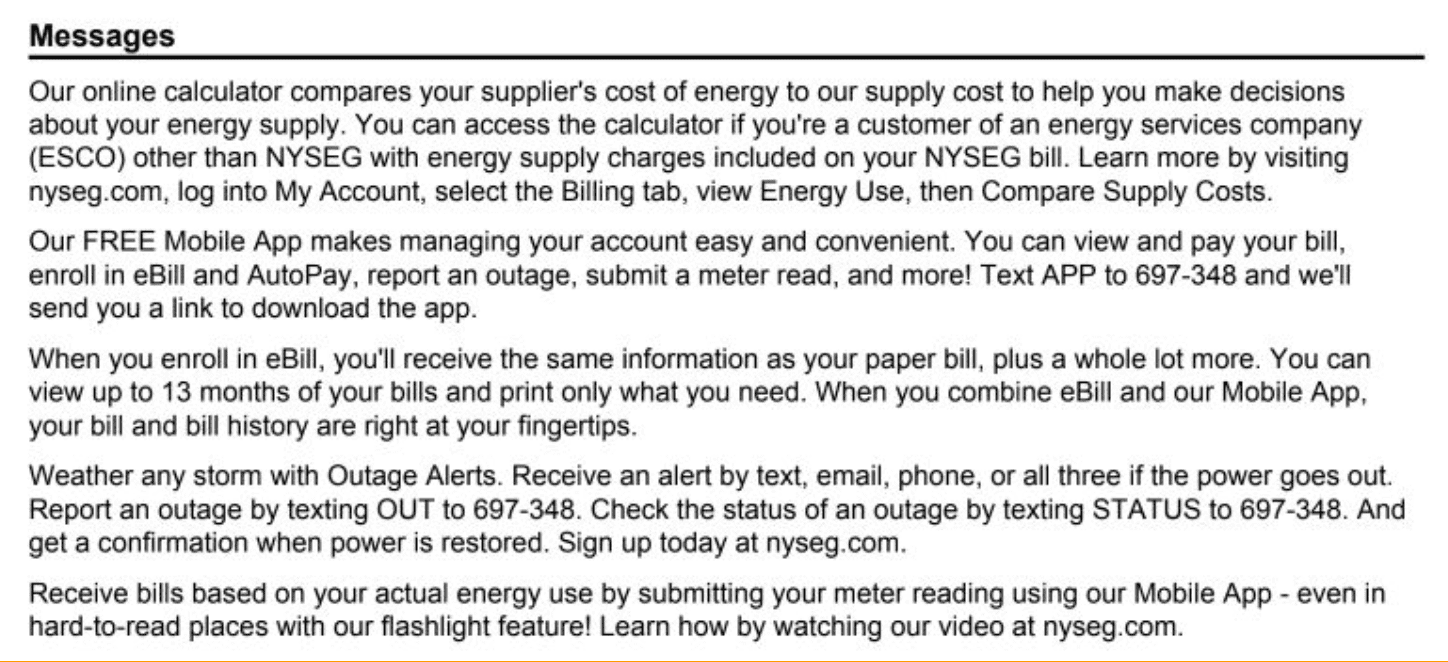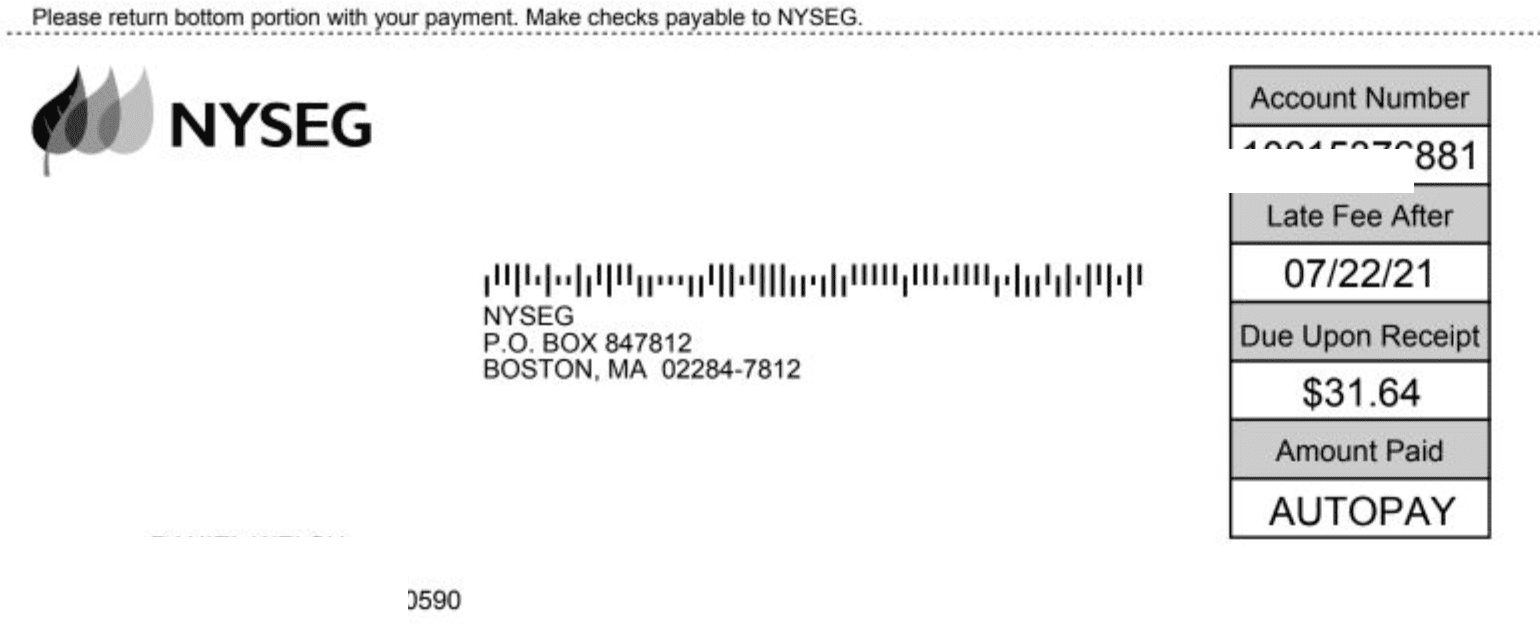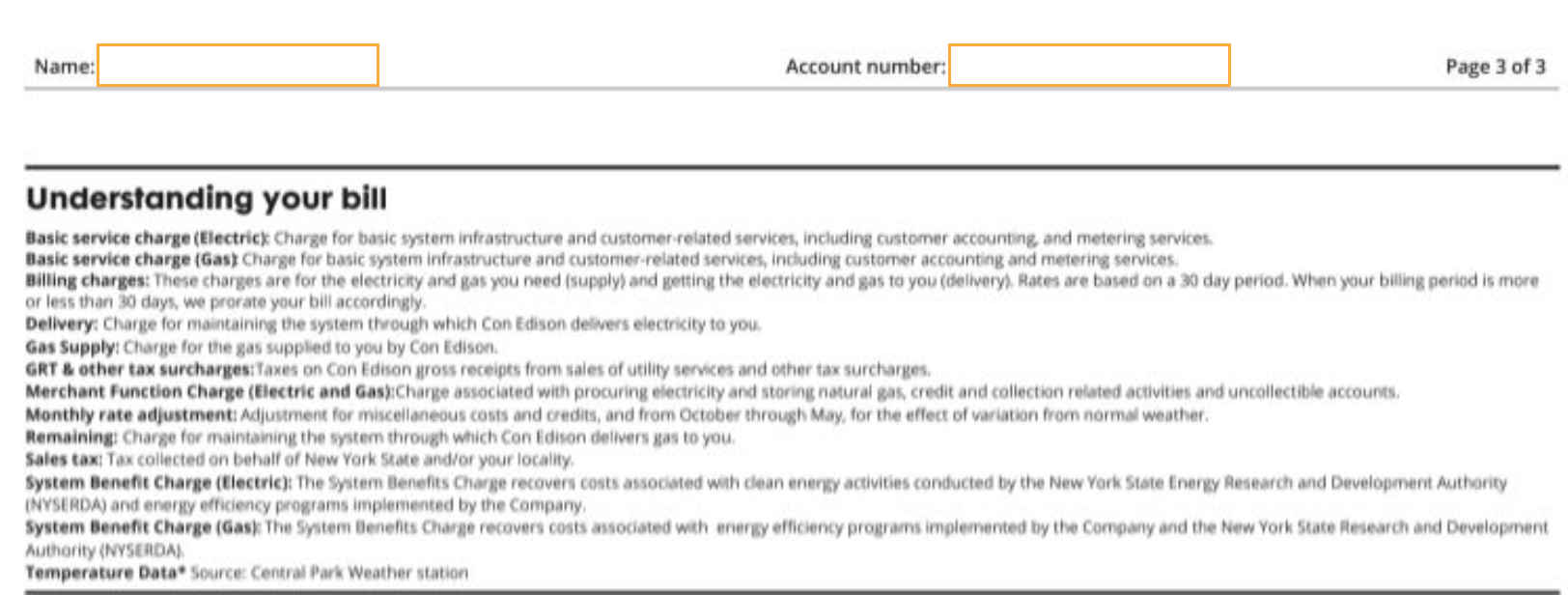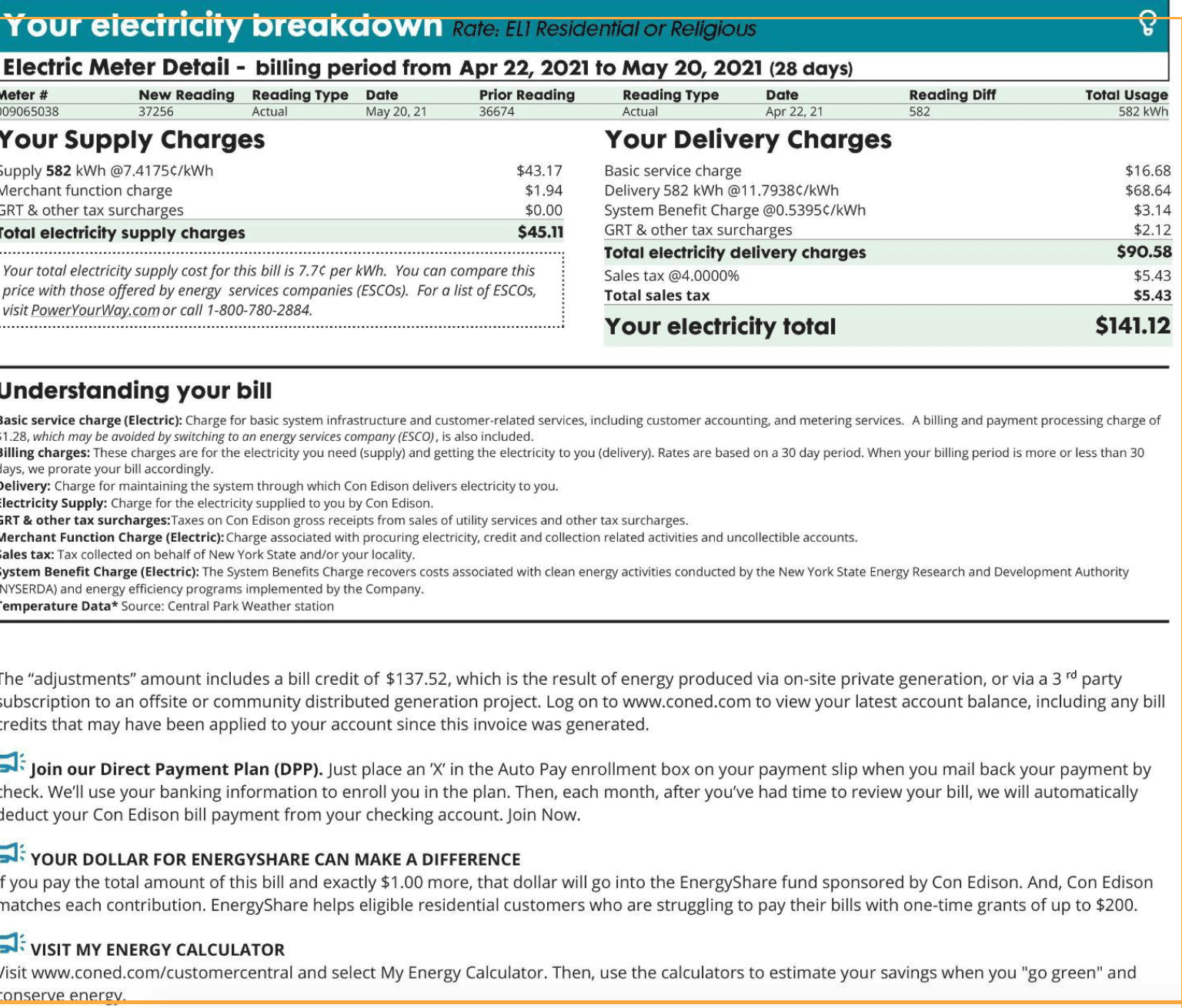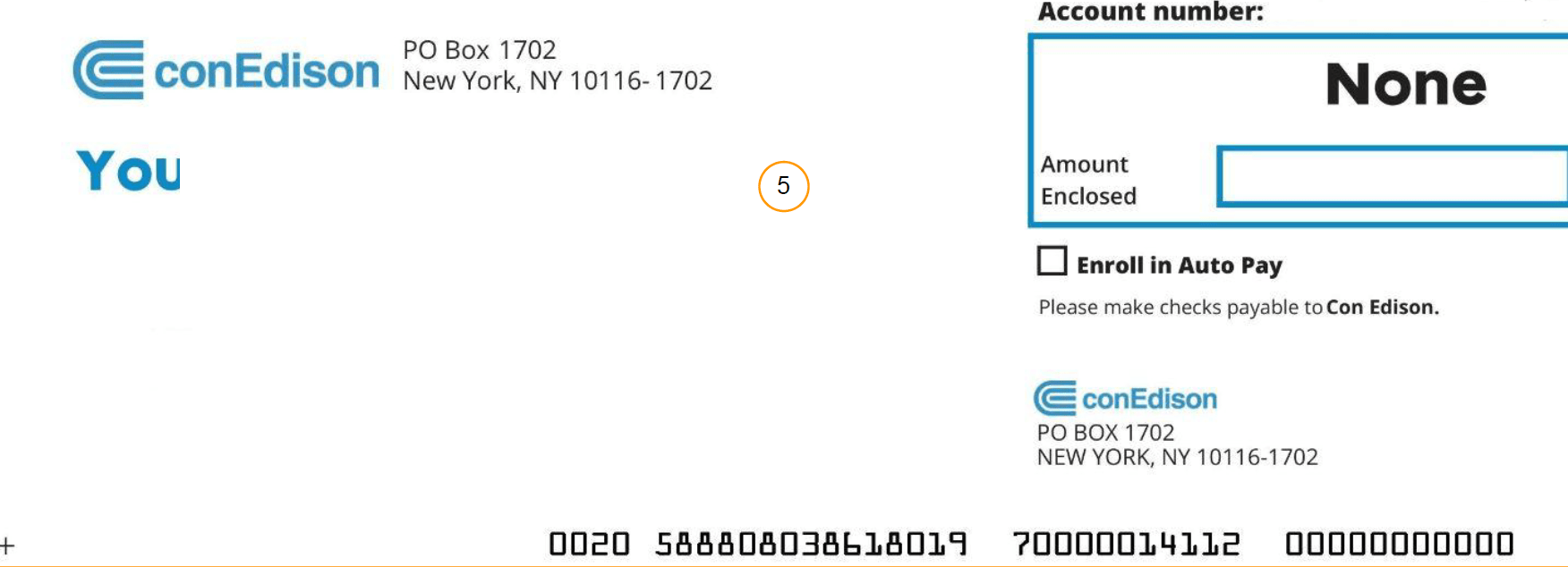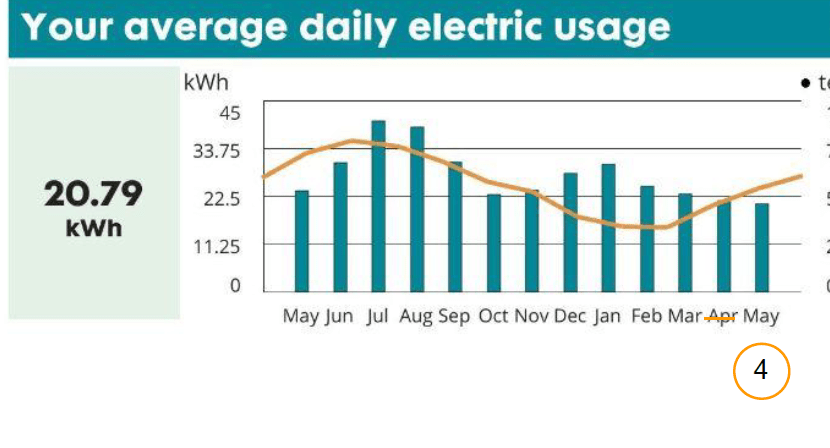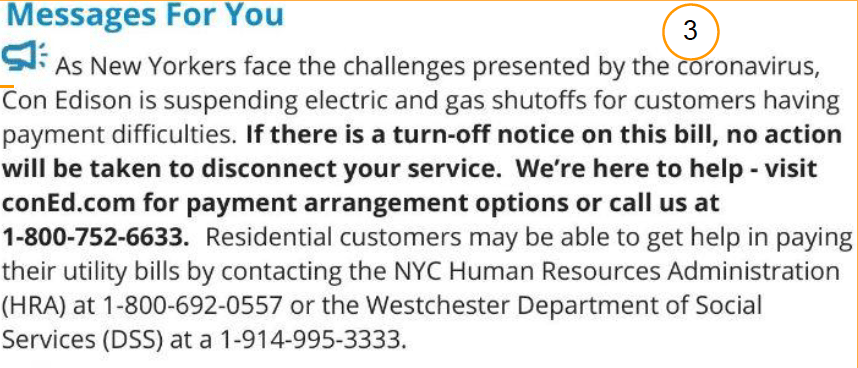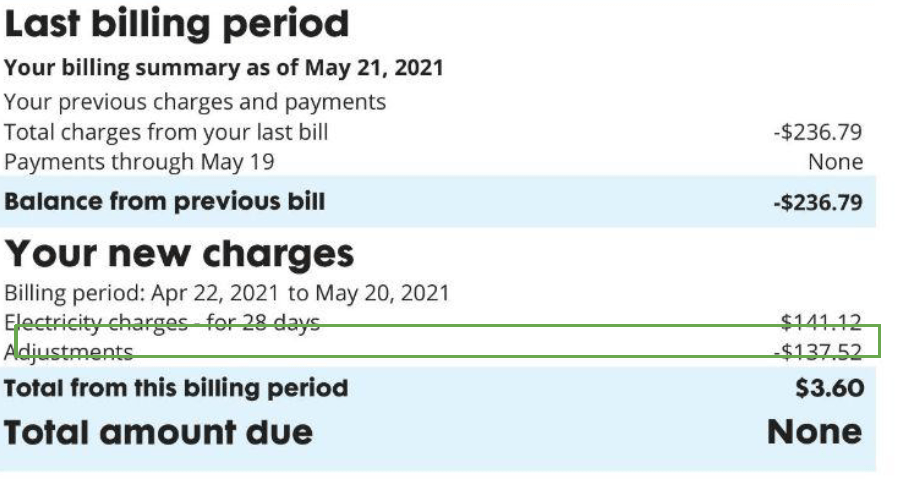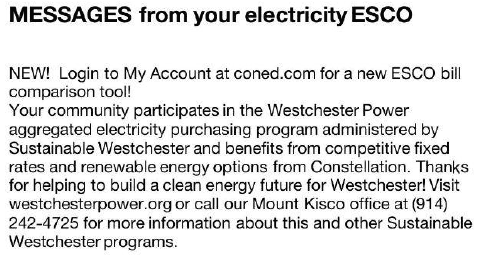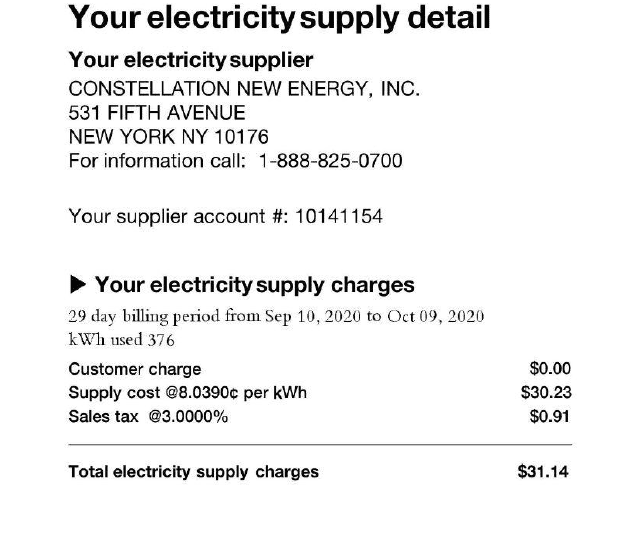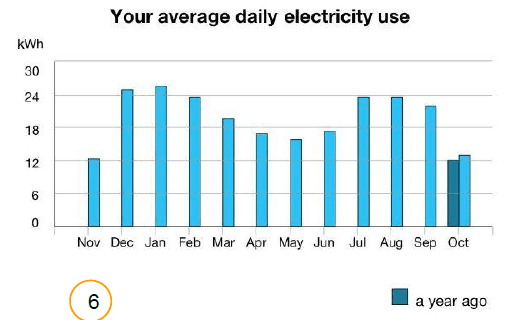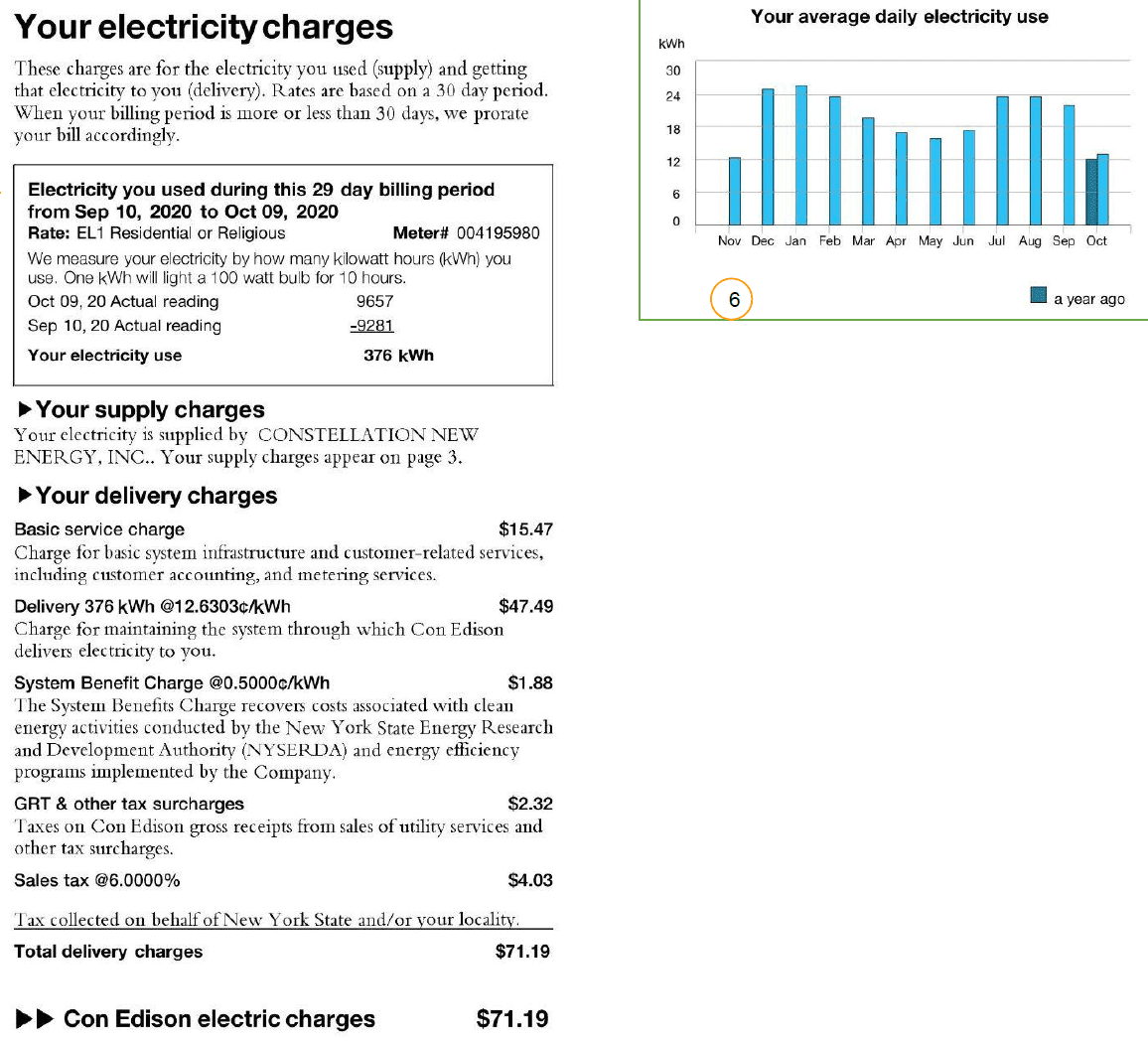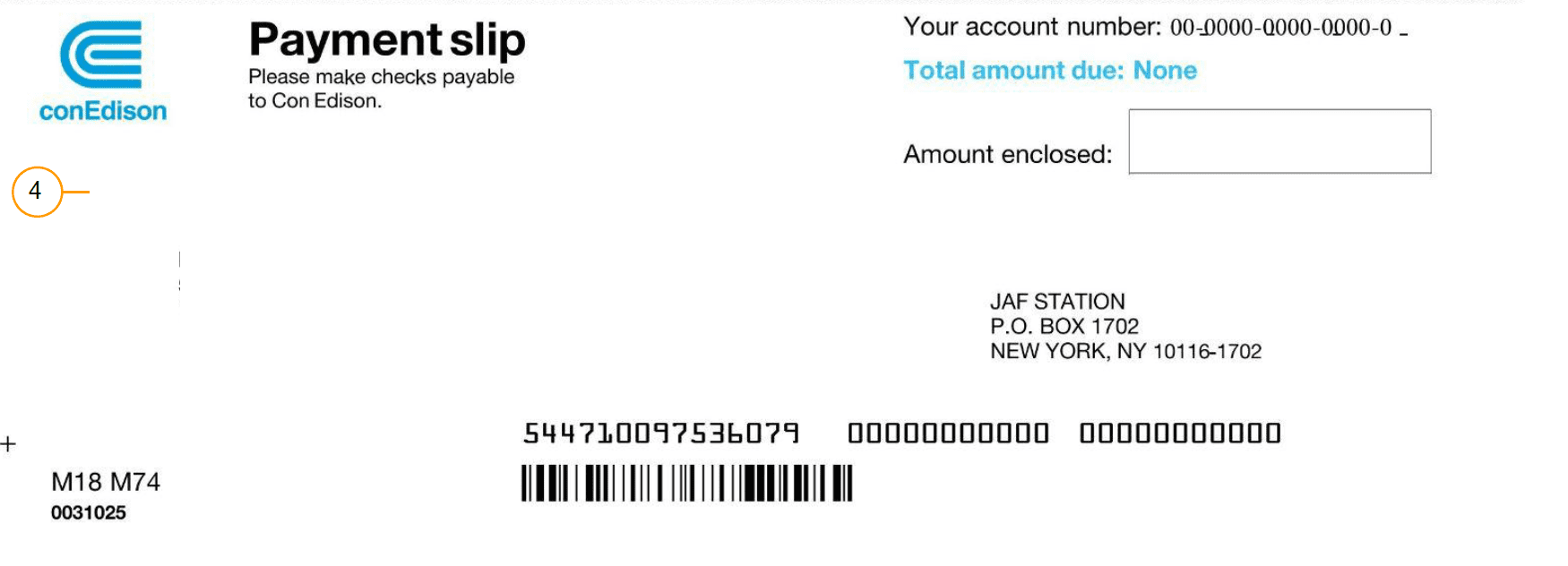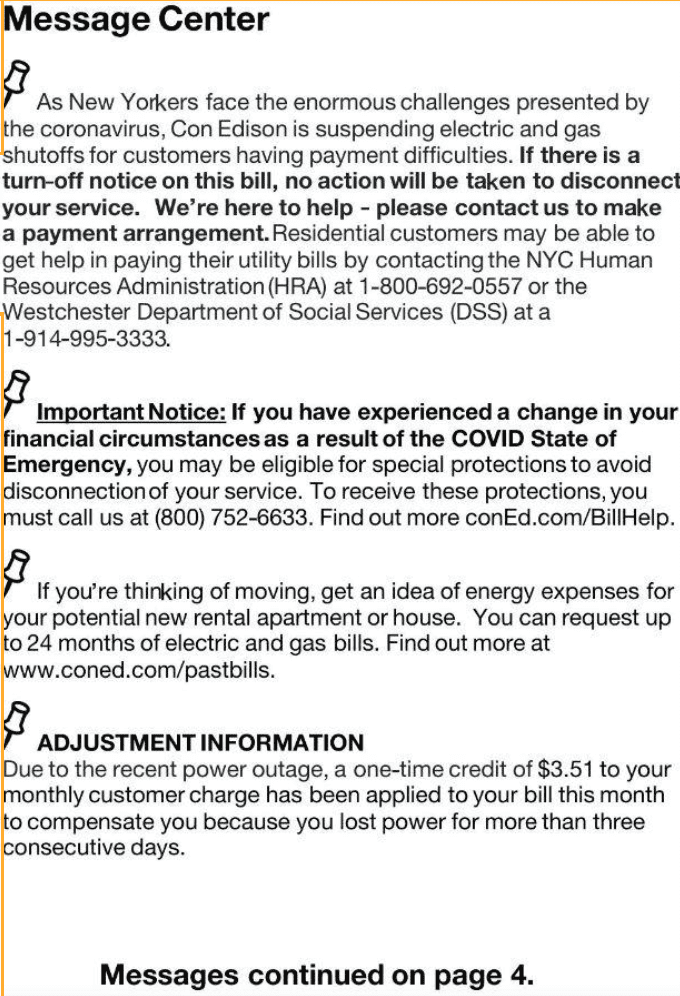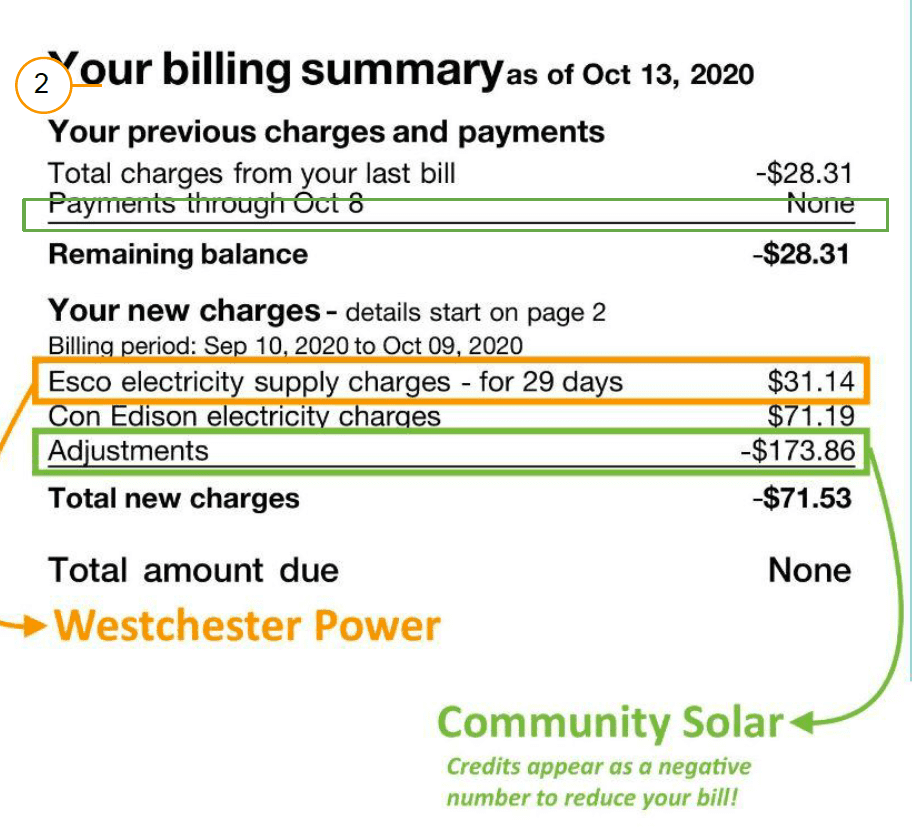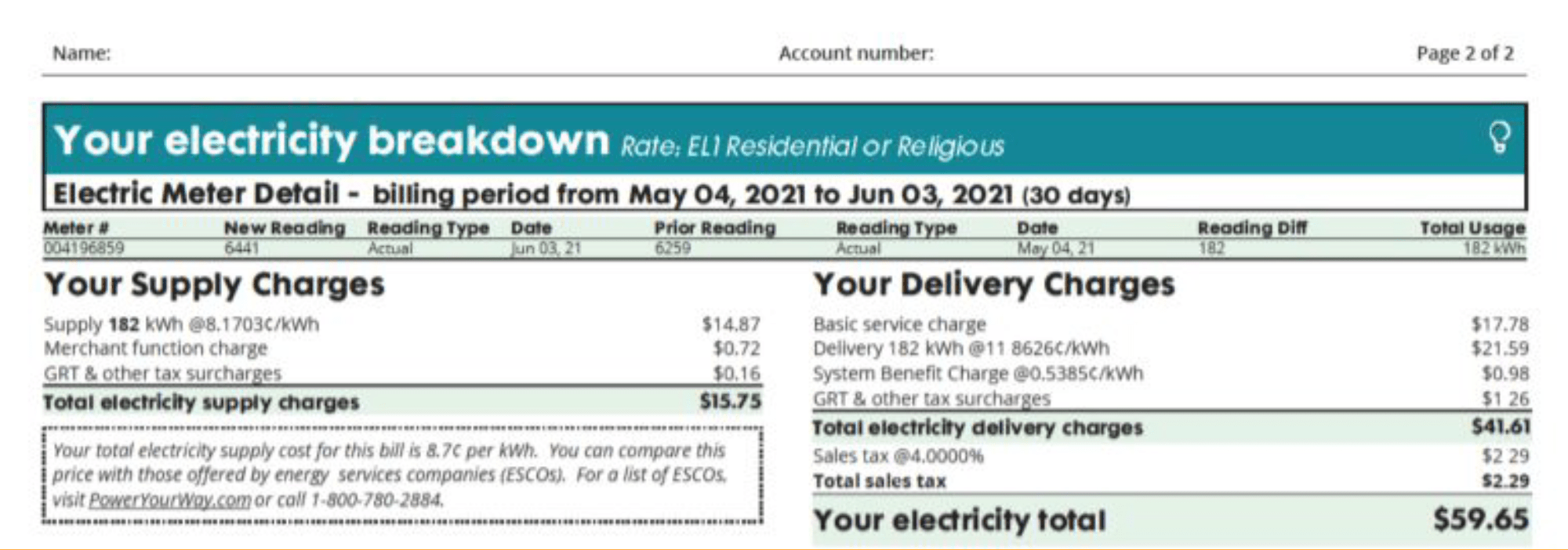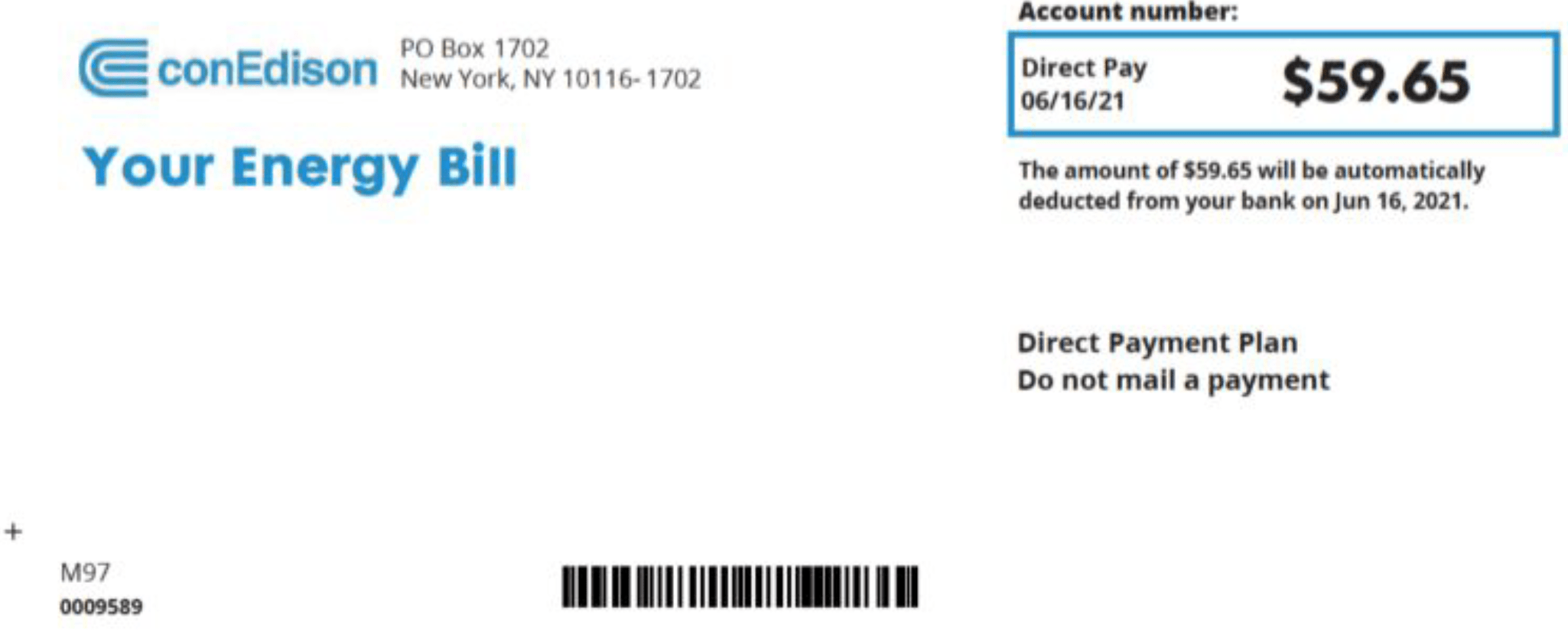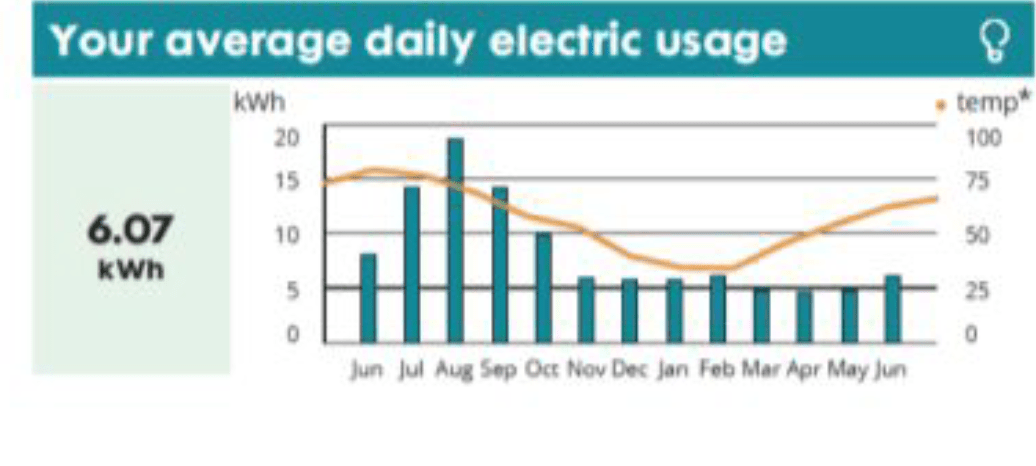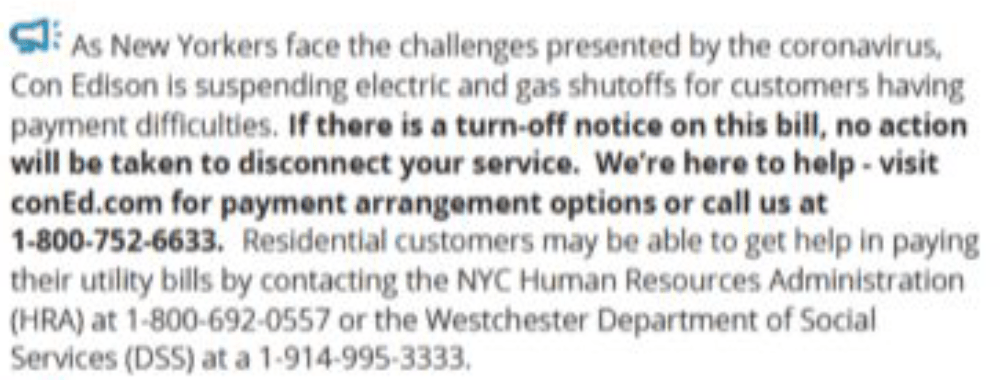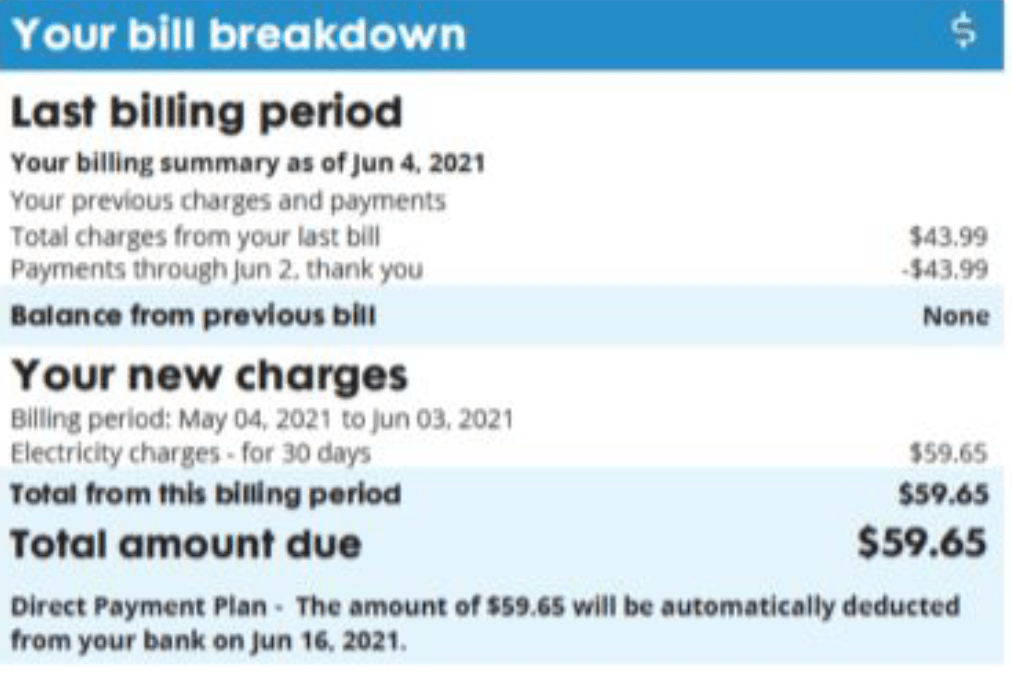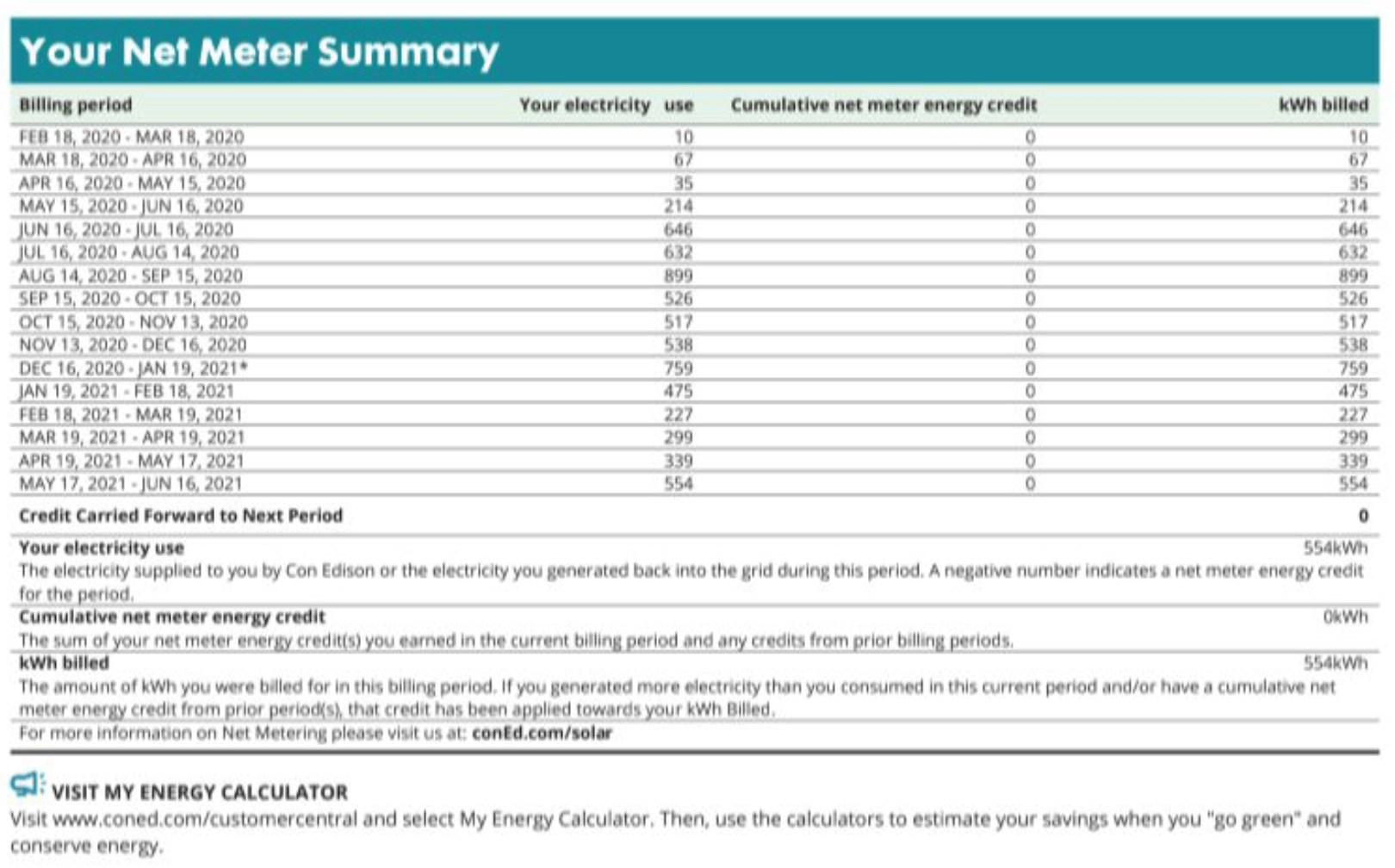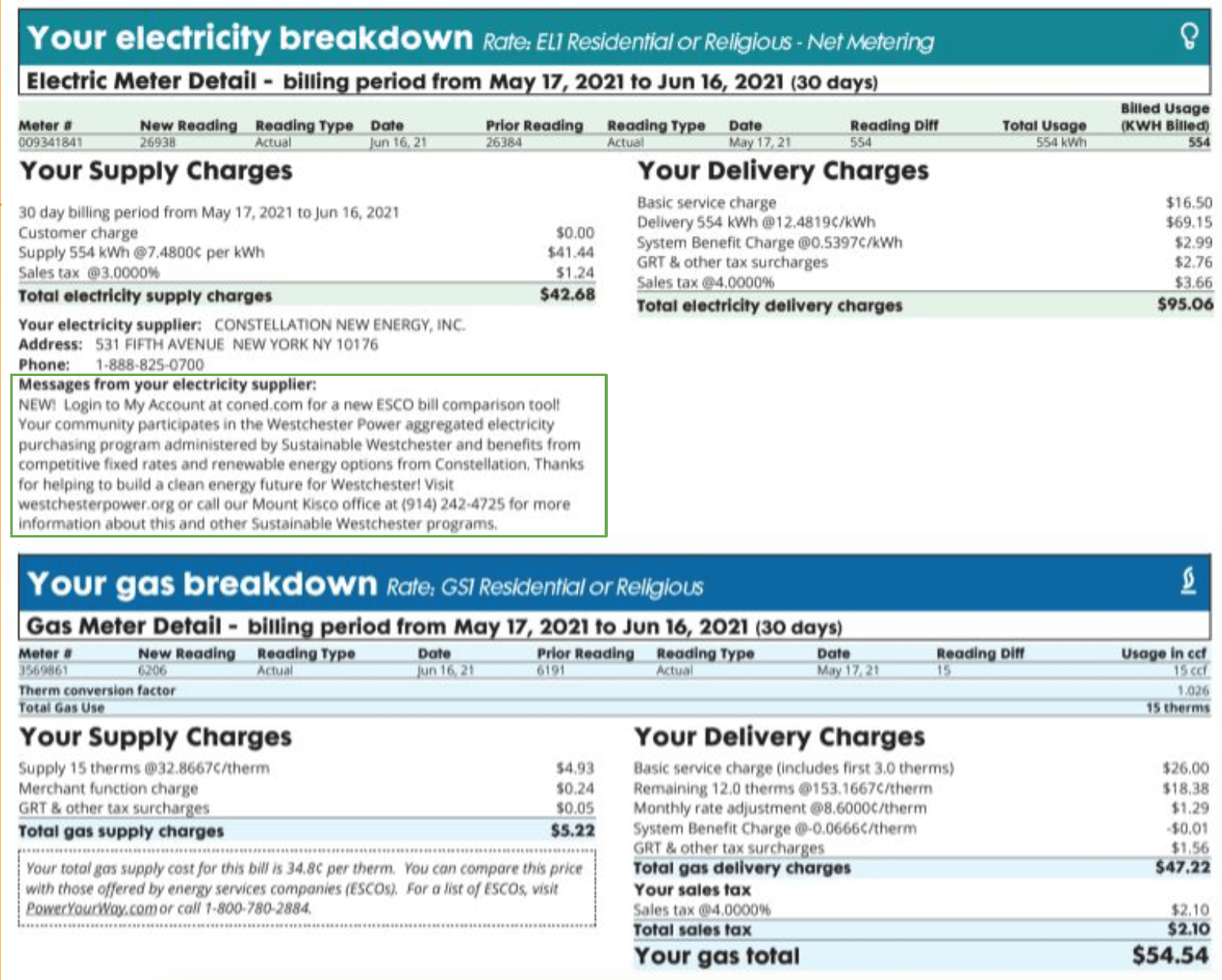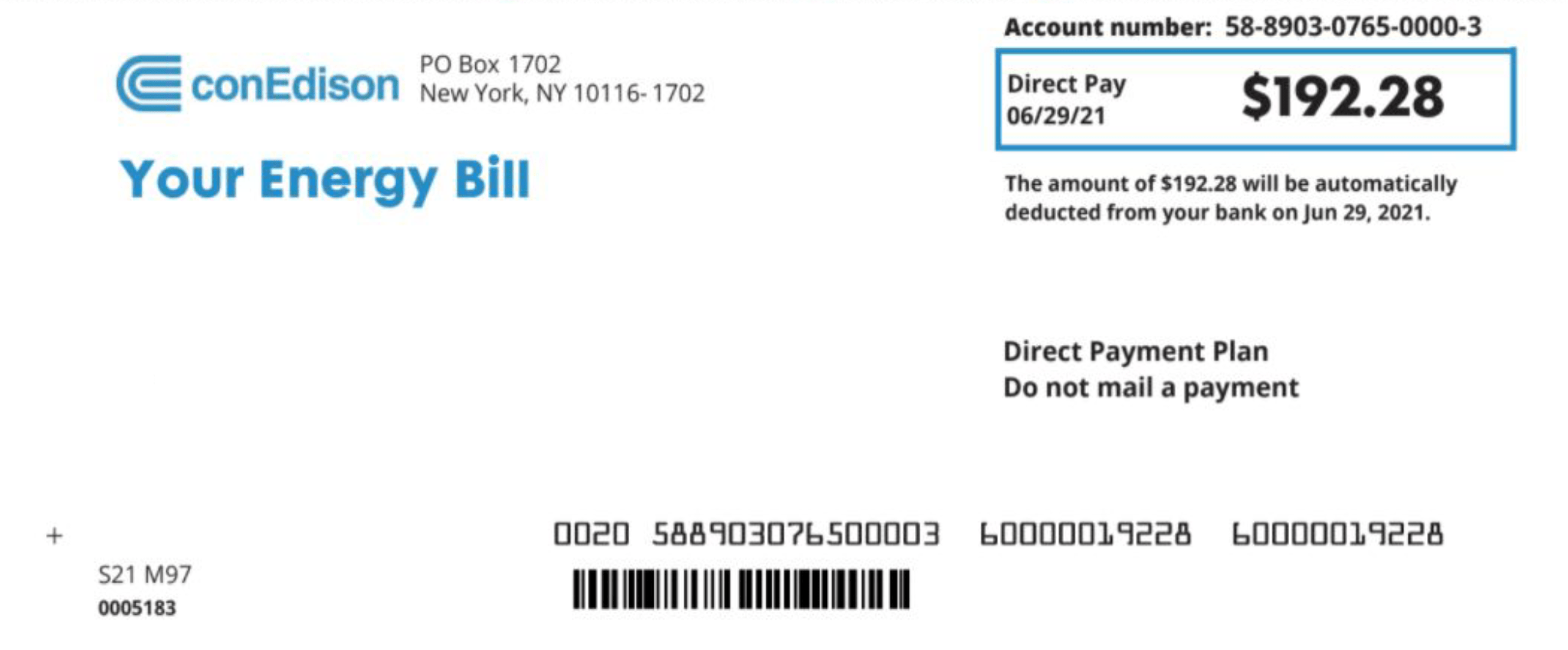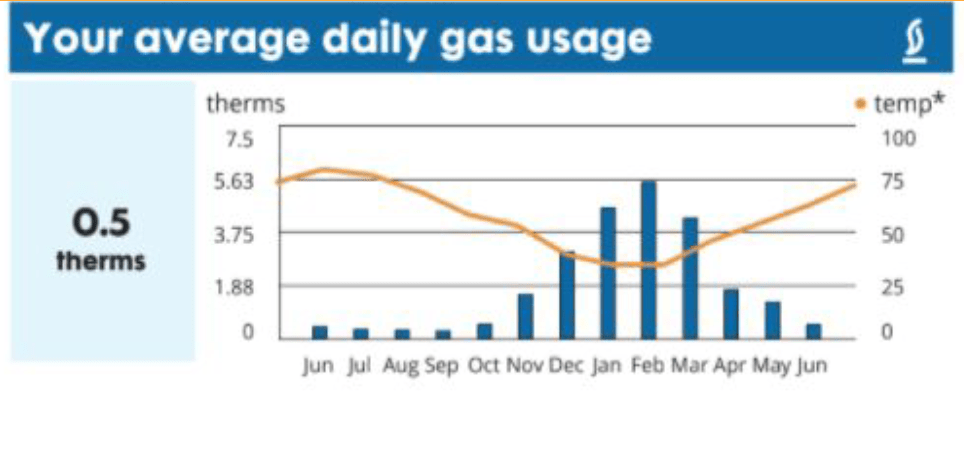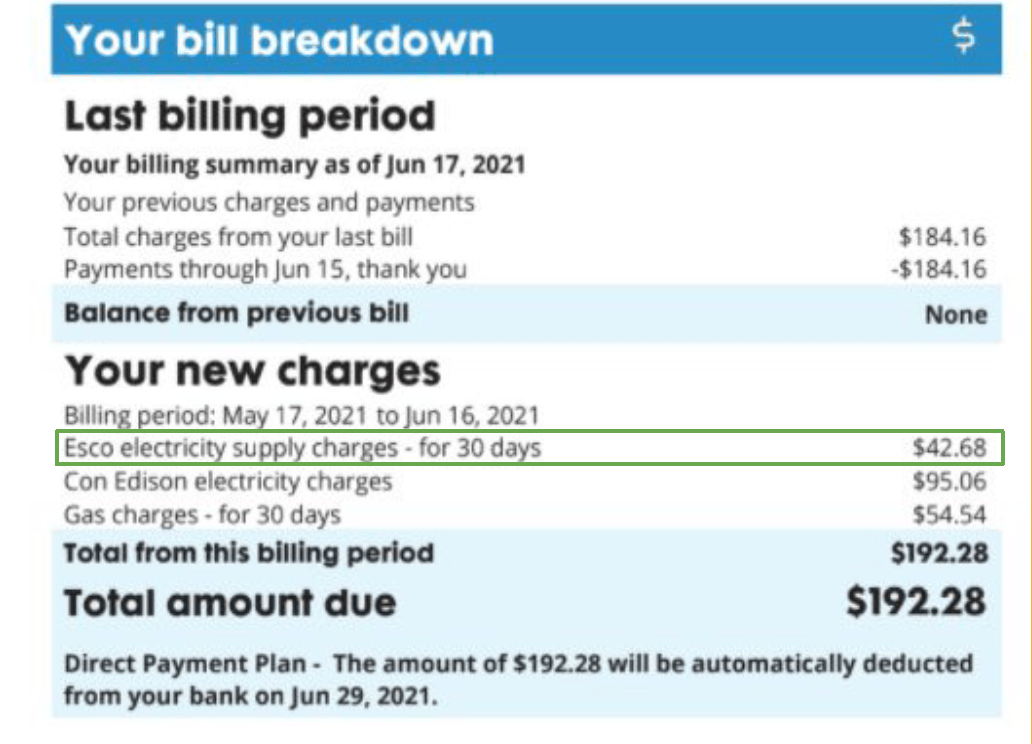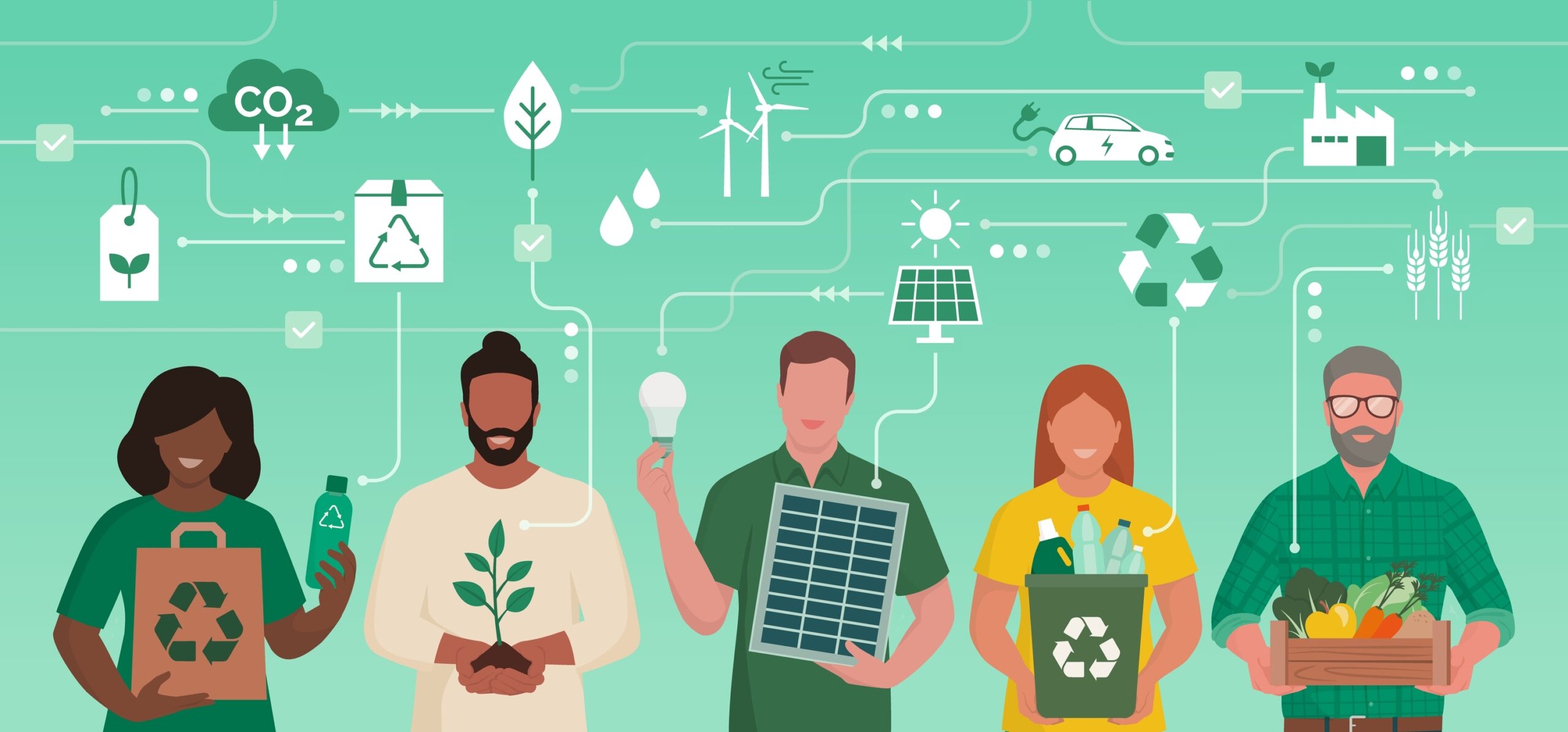

Why Choose a Career in Clean Energy?
Clean energy workforce development is essential for fighting climate change, creating good jobs, and building a fair economy. Clean energy jobs are growing quickly as more people and businesses switch to renewable energy. Sustainable Westchester is dedicated to helping communities access these opportunities by connecting job seekers with training and employers.
WEDNESDAY, JUNE 18, 2025 | 2:00PM – 6:00PM | WESTCHESTER COUNTY CENTER, WHITE PLAINS, NY | FREE PARKING WILL BE AVAILABLE
WESTCHESTER COUNTY CLEAN ENERGY JOBS AND RESOURCE FAIR
The Clean Energy Jobs and Resource Fair will enable participants to connect with employers about well-playing jobs, network with clean energy professionals, and explore industry training programs. This event is designed for individuals from all backgrounds and experience levels who are interested in exploring opportunities in the growing clean energy sector.
FIND THE CAREER FAIR - JUNE 2025 PROGRAM HERE
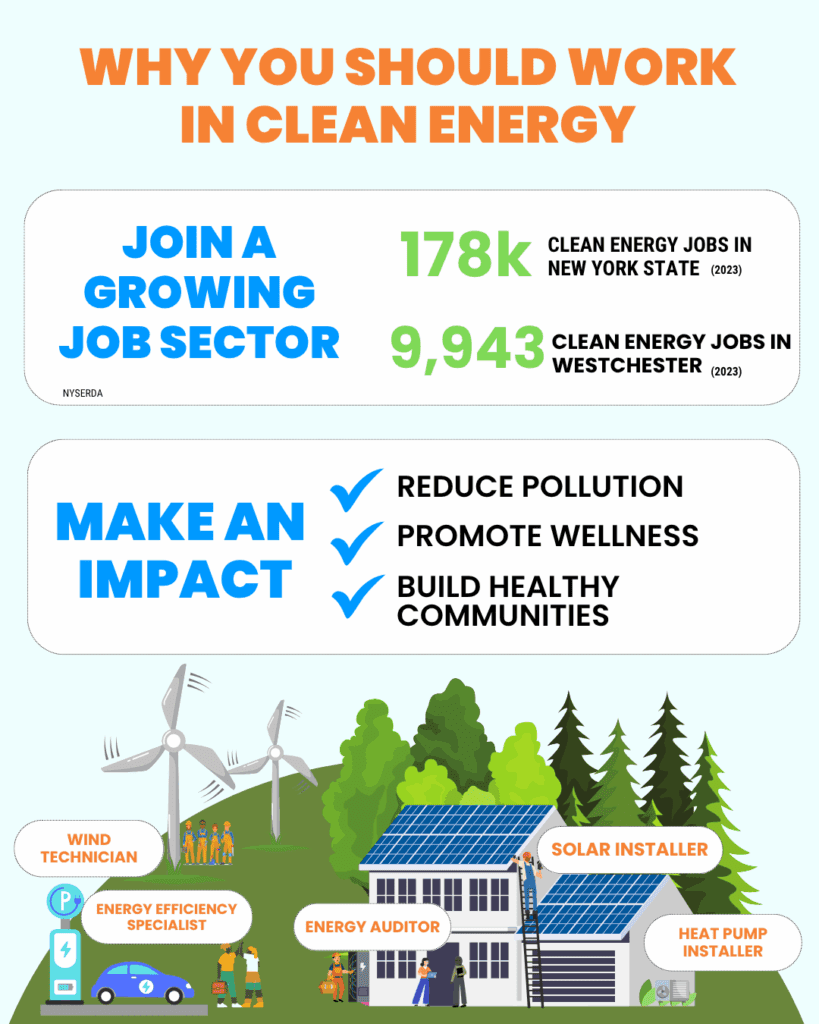
Watch this video brought to you by New Yorkers for Clean Power:
FIND A JOB
Looking to start or advance your career in the clean energy industry? Explore our job board brought to you by Untapped Solutions to discover exciting opportunities in clean energy and more. Whether you’re a seasoned professional or just starting out, your journey begins here.
BUILD YOUR RESUME
Stand out in the growing clean energy job market with a professionally tailored resume. Use Untapped Solutions’ easy-to-navigate resume builder to showcase your skills and experience in a way that catches employers’ attention.
COMING SOON
CLEAN ENERGY ACCELERATOR
Accelerating a Just Transition and Building the Climate Career Workforce
In partnership with Westchester County’s Office of Economic Development, Sustainable Westchester has launched the Clean Energy Accelerator. Through this program, clean energy stakeholders collaborate to strengthen Westchester’s green economy by:
- Identifying workforce needs in clean energy
- Connecting residents to training programs and job opportunities
- Building robust career pathways
- Strengthening local businesses to meet growing clean energy demand
CLEAN ENERGY JOB AND RESOURCE FAIRS
We proudly hosted two highly successful Clean Energy Job and Resource Fairs in 2024. Click below to read more:
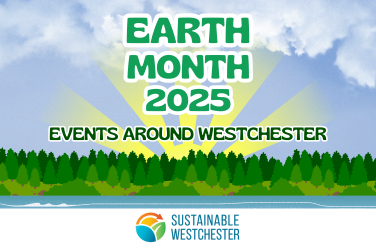
Westchester Earth Month Events 2025
– SEE YOU NEXT YEAR – SEE YOU NEXT YEAR – SEE YOU NEXT YEAR – SEE YOU NEXT YEAR
– SEE YOU NEXT YEAR – SEE YOU NEXT YEAR – SEE YOU NEXT YEAR – SEE YOU NEXT YEAR

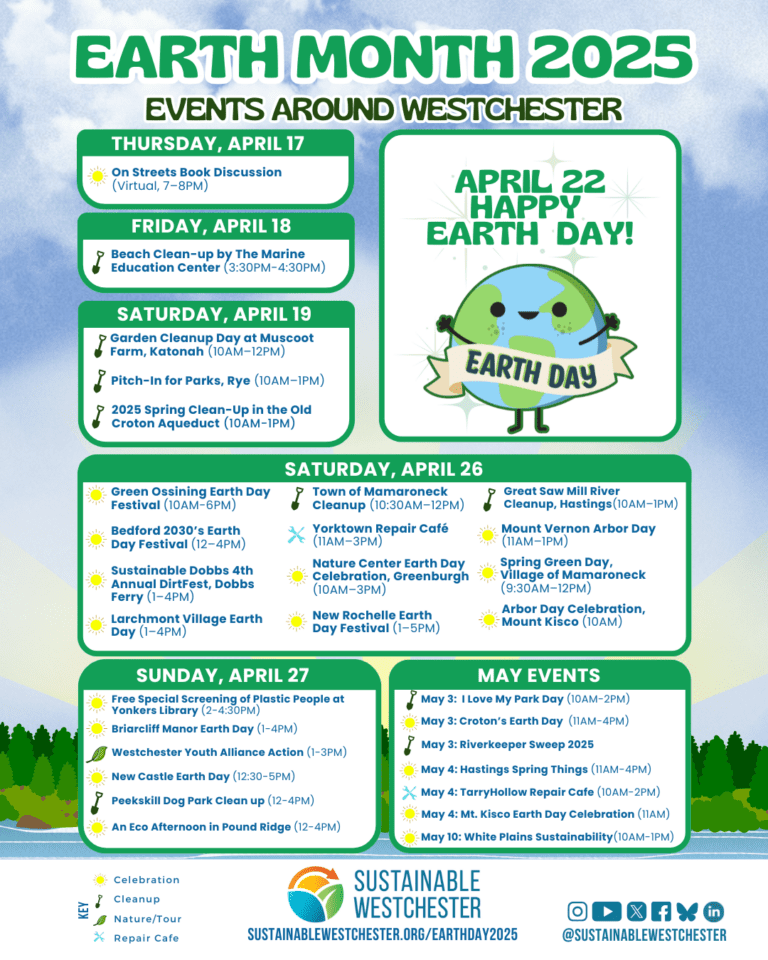
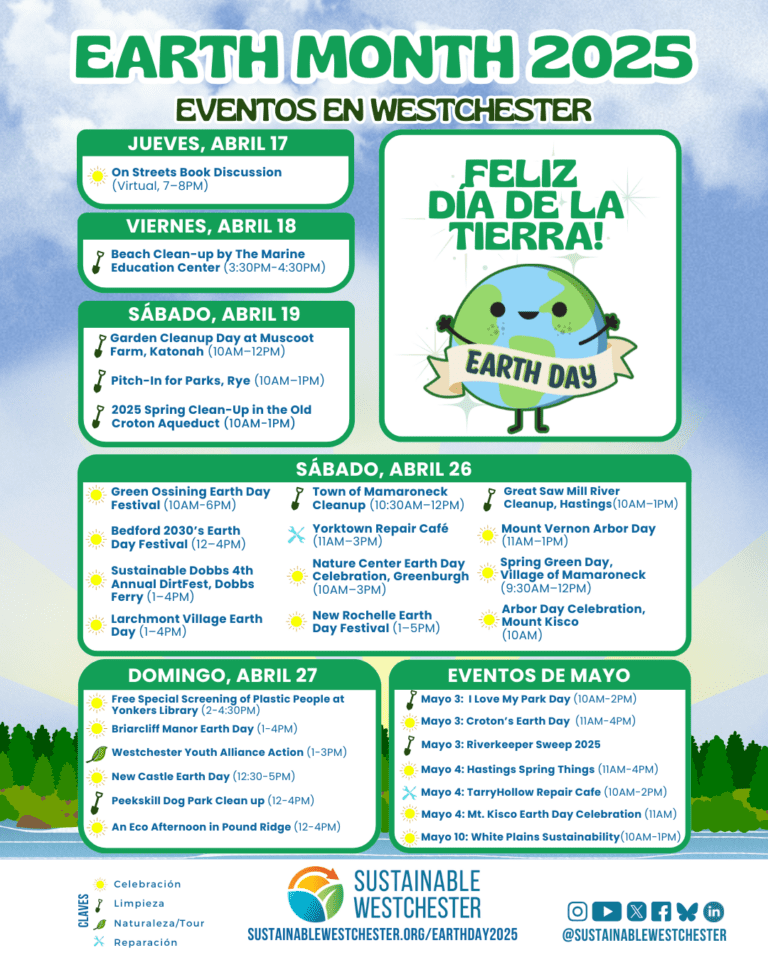
Saturday, April 5th
Earth Month DEF Compost Distribution Event | 10:00 AM – 2:00 PM | Willson’s Woods Park, Mt. Vernon, NY
Pleasantville Repair Cafe | 10:30 AM – 2:30 PM | Emanuel Lutheran Church, 197 Manville Road, Pleasantville, NY
Tarrytown Vine Squad | 10:00 AM – 12:00 PM | Hikers’ Parking Lot at Wilson Park Drive and Tower Hill Road Tarrytown, NY
Pound Ridge Land Conservancy – Volunteer Work Session | 10:00 AM – 12:00 PM | Armstrong Preserve 1361 Old Post Road, Pound Ridge, NY
Sleepy Hollow Earth Month Festival & Picnic | 10:00 AM – 12:30 PM | Barnhart Park, Sleepy Hollow, NY
Sunday, April 6th
Ardsley Pollinator Day: Free Native Plant Giveaway! | 12:00 PM – 4:00:00 PM | Ardsley Community Center, 18 Center Street, Ardsley, NY
Earth Month DEF Compost Distribution Event | 10:00 AM – 2:00 PM | Glen Island Park, New Rochelle, NY
Talk by NYC Department of Environmental Protection (DEP) Commissioner Rohit Aggarwala, hosted by the Friends of the Old Croton Aqueduct | 2:00 PM – 4:00 PM | Warner Library, Tarrytown, NY
Hastings’ 3rd Birthday of Take It or Leave It FREE swap stop |11:00 AM-33:00 PM|Andrus on Hudson 185 Broadway
Wednesday, April 9th
Earth Month DEF Compost Distribution Event | 4:00 PM – 7:00 PM | Household Materials Recycling Facility, 15 Woods Rd, Valhalla, NY
Strategies for Dealing with Deer by Ardsley Pollinator | 7:00 PM – 8:30 PM | Virtual event
Thursday, April 10th
Pelham Tree Conservancy Kickoff with Dr. Andrew Reinmann | 7:00 PM – 8:30 PM | Town of Pelham Public Library, Pelham, NY
Friday, April 11th
Westchester County Mobile Shredder | 10:00 AM – 1:00 PM | Cortlandt Town Hall, 1 Heady St, Cortlandt, NY
Saturday, April 12th
One Hour Flash Clean-Up – Sleepy Hollow Riverwalk | 10:00 AM – 11:00 AM | Horan’s Landing Park, 57 River St, Sleepy Hollow, NY
Plant Pelham Native: How to Create Wildlife Habitat on Public Land | 10:15 AM – 12:00 PM | Town of Pelham Public Library, Pelham, NY
Thursday, April 17th
“On Trees” Book Discussion by FCWC | 7:00 PM – 8:00 PM | Virtual Event
FrogWatch USA Volunteer Training | 6:00 PM – 8:00 PM | The Nature Center at Greenburgh, 99 Dromore Road, Scarsdale, NY 10583
Friday, April 18th
Beach Clean-Up by The Marine Education Center | 3:30 PM – 4:30 PM | Harbor Island Park in Mamaroneck, NY
Saturday, April 19th
2025 Spring Clean-Up on the Old Croton Aqueduct | 10:00 AM – 1:00 PM | Old Croton Aqueduct in Irvington, NY, and north of Main Street School
Pitch-In for Parks Volunteer Day by Westchester Parks Foundation | 10:00 AM – 1:00 PM | Marshlands Conservancy, Rye, NY
GardenClean-Upp Day at Muscoot Farm | 10:00 AM – 12:00 PM | 51 Route 100, Katonah, NY
Sunday, April 20th
Croton Dam Hike | 1:00 PM – 3:00 PM | Croton Gorge Park – South end of lot Cortlandt, NY
Volunteers Needed: Arts and Crafting Day for Riverkeeper’s Fish Migration Celebration | Morning Session – 10:30 AM, Afternoon Session – 2:30 PM | 40 Somerstown Road Ossining, NY
Monday, April 21st
A Mother Earth Day Celebration: Honoring the Planet and its Stewards | 6:30 PM | Jacob Burns Film Center, 364 Manville Rd., Pleasantville, NY 10570
Tuesday, April 22nd
4th Annual Katonah-Lewisboro School District Sustainability Showcase | 5:30 PM – 7:00 PM | John Jay High School, 40 North Salem Road, Cross River, NY
Presentation: The Science Behind Climate Change | 7:00 PM | Lewisboro Library, 15 Main Street, South Salem, NY
Wartburg’s Day of Caring—Earth Day Celebration! | 3:00 PM – 6:00 PM | Wartburg Meadow — 1 Wartburg Place, Mount Vernon, NY
White Plains Youth Climate Action Fund Earth Day Celebration | 4:00 PM – 6:00 PM | White Plains Public Library, White Plains, NY
Earth Day: Native Plant Project with Pace University! | 9:00 AM – 12:00 PM | Environmental Pavilion in the Conservation Center at Pace University 861 Bedford Road Pleasantville, NY 10570
Bezack’s 18th Annual Blessing of the Hudson River | 7:30 AM Start Time | Habirshaw Park Beach, 35 Alexander Street, Yonkers, NY 10701
Wednesday, April 23rd
The Tailpipe In Your Kitchen: New Yorkers for Clean Power Teach In | 12:00 PM – 1:00 PM | Virtual Event
Thursday, April 24th
North American Butterfly Association: April 24 Meeting | 6:30 PM – 8:00 PM | Carriage House at Teatown, Ossining, NY
Green Ossining’s Youth Climate Panel, Climate and What Youth Have to Say About It | 7:00 PM – 8:30 PM | Hudson Valley Books for Humanity, 67 Central Avenue, Ossining 10562
Friday, April 25th
Somers’ Tree Planting for Arbor Day | 10:00 AM – 10:30 AM | Bailey Park – 335 Route 202 – Somers, NY
Saturday, April 26th
Green Ossining’s 15th Annual Earth Day Festival – RAIN OR SHINE!| 10:00 AM – 6:00 PM | Louis Engel Waterfront Park, Ossining, NY
Neperan Park Earth Month Celebration | 10:00 AM noon PPM|Neperan Park 4,3 Neperan Rd ,Tarrytown, NY 10591
Cranberry Lake Preserve’s Earth Day Giveback | 10:30 AM – 12:00 PM | Cranberry Lake Preserve Valhalla, NY
Groundwork Hudson Valley’s Great Saw Mill River Cleanup 2025 | 10:00 AM – 1:00 PM | South County Trailway Farragut Ave Parking Hastings-on-Hudson, NY
Westchester Parks Foundation’s Pitch In For Parks | 10:00 AM – 2:00 PM | Locations Across Westchester
Town of Mamaroneck’s Annual Spring/Earth Day Cleanup | 10:00 AM – 12:00 PM | next to 21 Winged Foot Drive at Gravel Parking Area
Village of Mamaroneck Spring 2025 Clean and Green Day | 9:30 AM – 12:00 PM | Columbus Park, Mamaroneck, NY
Yorktown Repair Cafe | 11:00 AM – 3:00 PM | Grace Lutheran Church, 3830 Gomer Stre,t Yorktown Heights, NY
Mount Vernon Arbor Day | 11:00 AM – 1:00 PM | Hartley Park, Mount Vernon, NY
Nature Center at Greenburgh: Earth Day Celebration | 10:00 AM – 3:00 PM | Nature Center at Greenburgh 99 Dromore Rd, Scarsdale, NY
Westchester Community College’s Annual Native Plant Sale | 10:00 AM – 1:00 PM | Westchester Community College across parking lost #1 Valhalla, NY
Sierra Club Atlantic Chapter’s Youth Summit | 12:00 PM – 3:00 PM | Virtual Event
Town of Cortlandt Earth Day Clean Up | 10:00 AM – 2:00 PM | Furnace Dock Lake, 100 Furnace Dock Road, Cortlandt Manor
Yonkers OCE Clean-Up at Old Croton Aqueduct State Historic Parkt | 8:30 AM – 9:30 AM | Walnut Street at Old Croton Aqueduct
Long Spring Hike | 9:00 AM – 12:PM | 201 Hawley Road, North Salem, NY 10560
Embodying Land Justice: Local Roots, Planetary Solidarity | 9:30 AM – 4:00 PM | 299 N Highland Ave, Ossining, NY 10562
Sunday, April 27th
Bedford Earth Day Festival (postponed from April 26)| 12:00 PM – 4:00 PM | Bedford Village Memorial Park, Greenwich Rd, Bedford, NY
Larchmont Village Earth Day Celebration (postponed from April 26)| 1:00 PM – 4:00 PM | Constitution Park, Larchmont, NY
New Rochelle Earth Day Festival (postponed from April 26)| 1:00 PM – 5:00 PM | Anderson Plaza, Anderson Street, New Rochelle, NY
Clean Up the Peekskill Dog Park! | 12:00 PM – 4:00 PM | 1795 Main St, Peekskill, NY
An Eco Afternoon in Pound Ridge | 12:00 PM – 4:00 PM | Pound Ridge Square, 55 Westchester Ave Pound Ridge, NY
Briarcliff Manor Earth Day | 12:00 PM – 4:00 PM | Law Memorial Park Pavilion, Briarcliff Manor, NY
Earth Month DEF Compost Distribution Event Valhalla | 10:00 AM – 2:00 PM | Household Materials Recycling Facility, 15 Woods Rd, Valhalla, NY
Earth Day Action by Westchester Youth Alliance | 1:00 PM – 3:00 PM | Hilltop Hanover Farm 1271 Hanover Street, Yorktown Heights, NY
Hastings Pollinator Pathway’s 5 Corners Garden Spring Tidy Up! | 10:30 AM – 12:00 PM | 5 Croners Garden (Chauncey and Broadway) Hastings-on-Hudson, NY
New Castle Earth Day | 12:30 PM – 5:00 PM | Gedney Park, Chappaqua, NY
Tarrytown Lakes Cleanup with Hackley Lakekeepers | 10:00 AM – 2:00 PM | Tarrytown Lakes – Neperan Road Parking Lot, Tarrytown, NY
Free Special Screening of Plastic People | 2:00 PM – 4:30 PM | YONKERS RIVERFRONT LIBRARY One Larkin Center, Yonkers, NY
Lower Hudson Valley Social Forum 2025 | 11:00 PM – 5:00 PM | White Plains Library, White Plains NY
Wild Woods Restoration Project Day #1 | 10:00 AM – 12:00 PM | Private Property in Bedford NY
Bedford, New York
TEAC’s Spring Seeding Workshop and Vine Removal Demo | 10:00 AM – 12:00 PM | Lyndhurst Welcome Center, 635 Lyndhurst Museum Lane, Tarrytown, NY
10591 Free Day | 9:00 AM – 5:00 PM | Sleepy Hollow and Tarrytown, NY
Tuesday, April 29th
Ardsley Pollinator Pathway’s Free Tree and Shrub Sapling Giveaway | 5:00 PM – 7:30 PM | The Greenburgh Public Library, Elmsford, NY
Wednesday, April 30th
Wild Woods Restoration Day #2 | 10:00 AM – 12:00 PM | Private Property in Bedford, New York
Saturday, May 3rd
Sustainable Dobbs 4th Annual Dirt Fest (postponed from April 26)| 1:00 PM – 4:00 PM | Dobbs Ferry Waterfront Park, Dobbs Ferry, NY
Croton’s Earth Day Celebration | 11:00 AM – 4:00 PM | Senasqua Park 2 Elliott Way, Croton-on-Hudson, NY
I Love My Park Day in Croton | 10:00 AM – 2:00 PM | Quaker Bridge Road, Croton-on-Hudson, NY
I Love My Park Day in Yonkers | 10:00 AM – 2:00 PM | Tibbets Brook Park, Yonkers, NY
Riverkeeper Sweep 2025 | Locations throughout New York City and the Hudson Valley
Port Chester Rye Sustainability Seed Swap & Giveaway | 10:00 AM – 12:00 PM | Port Chester – Rye Brook Public Library, 1 Haseco Ave, Port Chester, NY
Cortland Town Wide Yard Sale | 10:00 AM – 4:00 PM | Cortland Waterfront Park, 41 Riverview Street, Cortland, NY
Rye Community Clean Up! | 9:00 AM – 11:00 AM | See website for multiple locations
Sunday, May 4th
Hastings Spring Thing | 11:00 AM – 4:00 PM | Warburton Ave, Downtown Hastings, NY
UNA-Westchester Annual Meeting “Protecting the Environment for Healthier Communities: Westchester Leads the Way”| 2:00 PM – 4:00 PM | Grinton I. Will Library, 1500 Central Park Ave, Yonkers
Friday, May 9th
Teatown Planfest Day One | 3:00 PM – 7:00 PM | Teatown Lake Reservation, 1600 Spring Valley Rd, Ossining, NY
Saturday, May 10th
White Plains Sustainability Fair | 10:00 AM – 1:00 PM | Delfino Park, 110 Lake Street, White Plains, NY
Teatown Plantfest Day Two | 9:00 AM – 2:00 PM | Teatown Lake Reservation, 1600 Spring Valley Rd, Ossining, NY


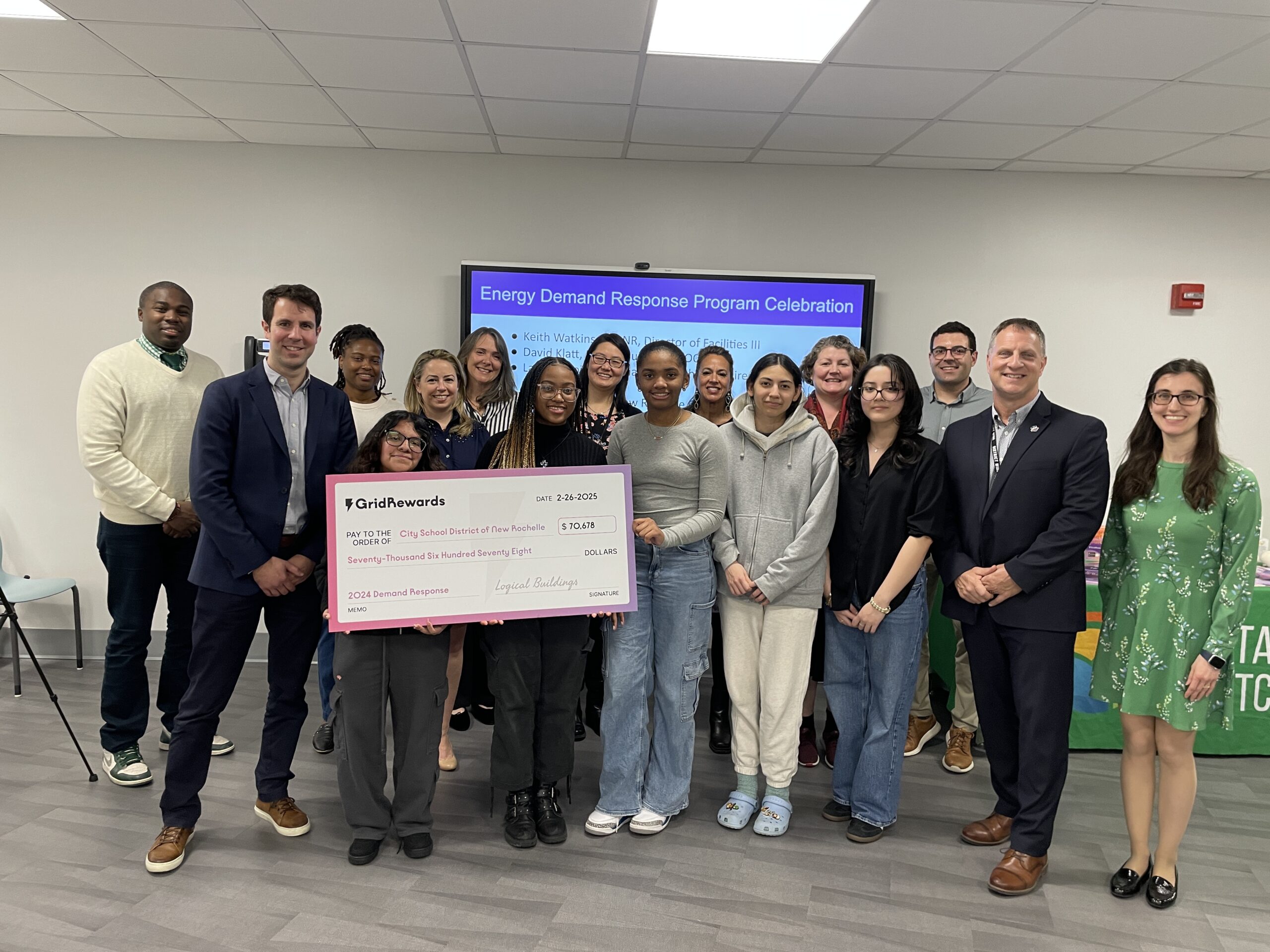
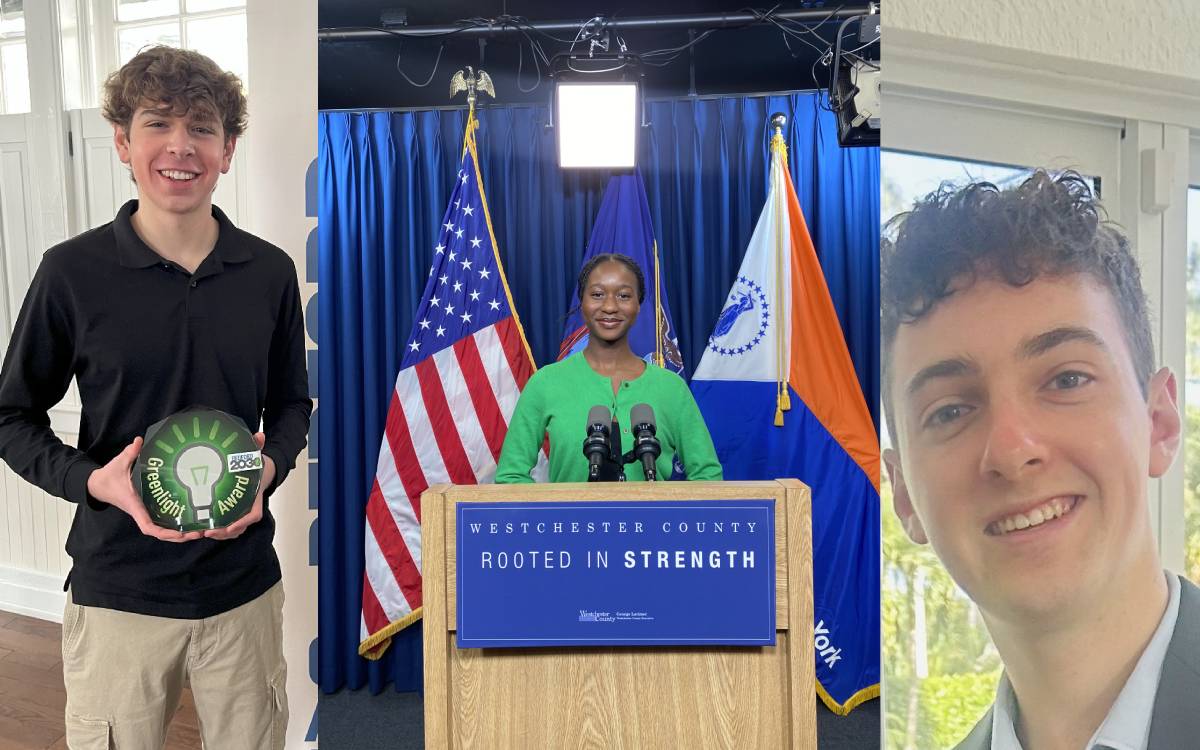
Author: Matthew Gutierrez
Three students, three stories highlighting the intersection of sustainability, technology, and economic incentives. As the students outline below, environmental initiatives can be impactful and financially beneficial. In this case, it’s thanks to GridRewards, an award-winning, free app that connects homeowners with their Con Ed account and tells users when and how to reduce their energy usage. Maybe best of all, homeowners can earn extra cash and reduce their energy bills year-round.
Carter Medved, Keyera Gordon, and Aidan Schissler are not only participating in local projects—they’re inspiring others and shaping their future careers around environmental stewardship. Each plans to continue their sustainability education in college. Their experiences offer a glimpse into the growing youth movement for climate action in Westchester County and the innovative approaches they’re employing to create a more sustainable future.
We spoke with each student about their experience with GridRewards, the importance of reducing energy consumption, and their thoughts on growing up in a warming world.
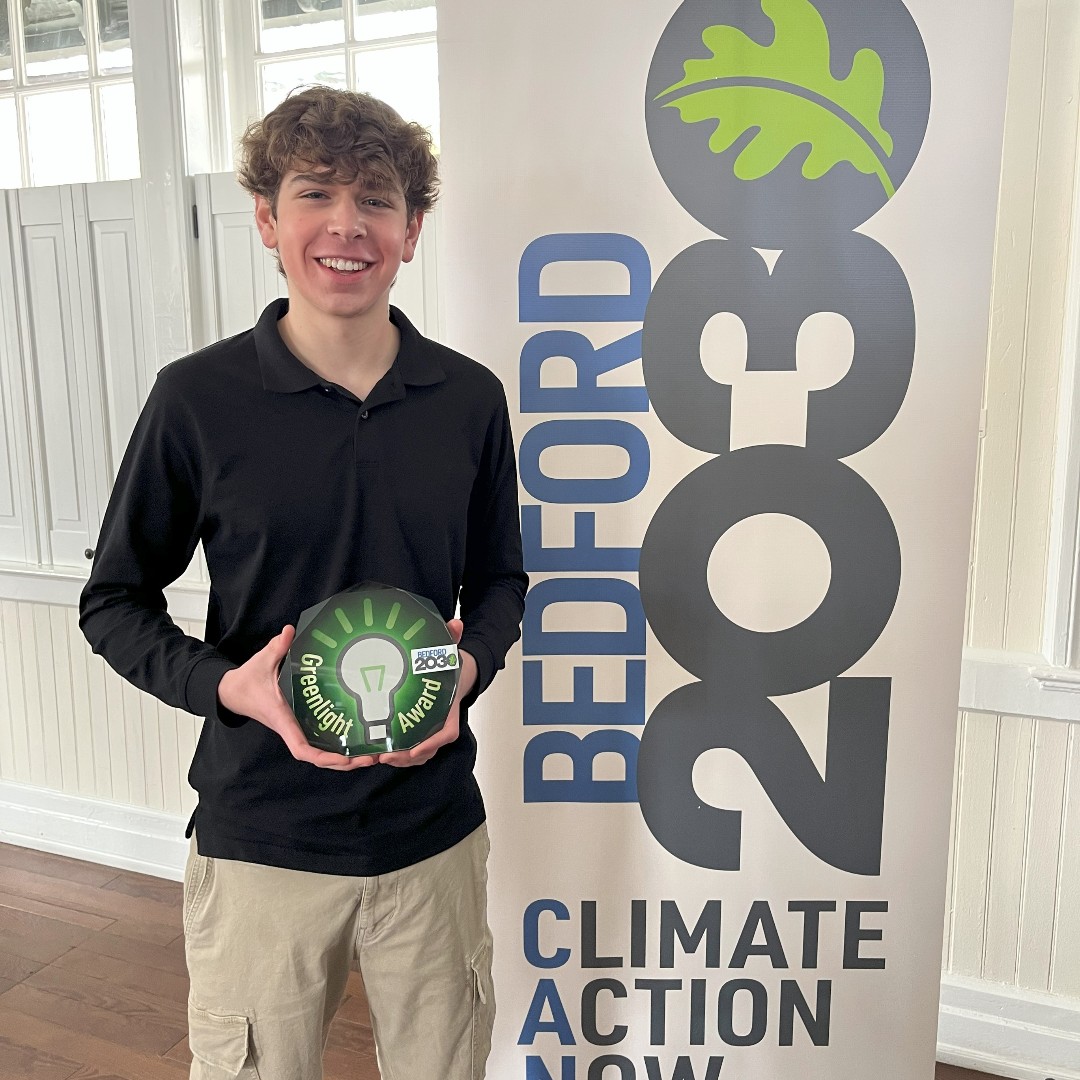
Carter was awarded first place with a cash prize of $500 for his project, “Powering Families Towards Sustainability. His impactful campaign to incentivize homes to adopt the Grid Rewards program, reducing carbon-intensive peaker plants’ reliance on electricity needs, impressed the judges. His successful outreach convinced the judges of the project’s potential for lasting impact.
Meet Carter Medved
In 2020, my family moved from New York City to Westchester. For the first time, I saw how I could impact the environment at home. When we moved here, I saw the effects of climate change, specifically because some of my friends’ homes flooded, causing extensive damage. I had never seen that in the city.
So, we did what we could at home. We switched to LED lights, bought an electric vehicle, and installed geothermal heat. This was inspiring because it helped the environment and was cost-effective, prompting me to help other families do the same.
I’m in the Westchester Youth Congress, which is a group of students from across Westchester trying to do things to help improve the community. Then I connected with Sustainable Westchester, where I began helping promote the GridRewards app because it’s pretty easy to help the environment and earn families extra money. Our selling points included: help the environment and earn money. I’d love to continue Grid Awards for larger buildings or building complexes, like in schools across Westchester. The schools can make money by reducing carbon emissions.
Not all people realize that going green is often a sound economical choice. You don’t need to spend thousands of dollars to help the environment.
GridRewards has helped make me even more interested in climate, so I’m looking at pursuing environmental studies in college. I’ve also been interested in starting my own business one day, and I’d love to create a business to benefit the environment. Last summer, I interned with Tetra, which helps make installing heat pumps in homes easier.
One of the biggest issues is education about climate change. Many people don’t even believe in climate change, which is astounding given that it’s happening in real time. That’s a big issue, so we need more education about it, what’s caused it, and how we can work to address it.
I’ve had education and support at school from teachers, community members, and other students. I encourage others to join local environmental organizations. Being in these motivated groups only pushes you even more. It’s empowering to surround yourself with these groups, and it’s great that conversations about the environment at school have become more normalized.
I have a website called WattSherpa, where I interview people about climate change. I recently spoke with a University of Chicago professor who said we’ll lose the battle unless we make significant innovations and changes. That’s the reality we have to face.
At the same time, I look around and see how so many more people are aware of the environment, and I have hope because the younger generations are driving change and innovation. I’m keeping the faith that we can do this.
Meet Keyera Gordon
I took AP environmental science in 2023, the first class in which I could apply what I learned outside school. My teacher introduced me to the Green Club, and Sustainable Westchester’s Lauren Brois gave a short speech about the initiatives there. Later in the year, she told us about the GridRewards initiative, which I joined. I talked to community members about the benefits of saving energy, and users get a rebate at the end of the summer. It’s cheaper to pay users to power down their energy use at peak times.
The experience with GridRewards was formative. I love environmental science and plan to major in it at Spelman College. In class, we did a lesson on environmental racism. I saw that in the New Rochelle neighborhood where I live, highways were built nearby, causing higher asthma rates compared to other communities. I found that incredibly interesting, so I wrote about it in my college essay.
My grandmother has a garden at my house. I recently did an intergenerational gardening project with her, and she talked to me about how she gardens. She grows tomatoes, strawberries, and all kinds of vegetables. She’s been gardening since she came to this country from Jamaica as a teenager.
I’m inspired by people like Raya Salter, an environmental activist who led a march with us. Although I’m not entirely sure what career path I want to take, seeing an environmental activist and a woman of color has been inspiring.
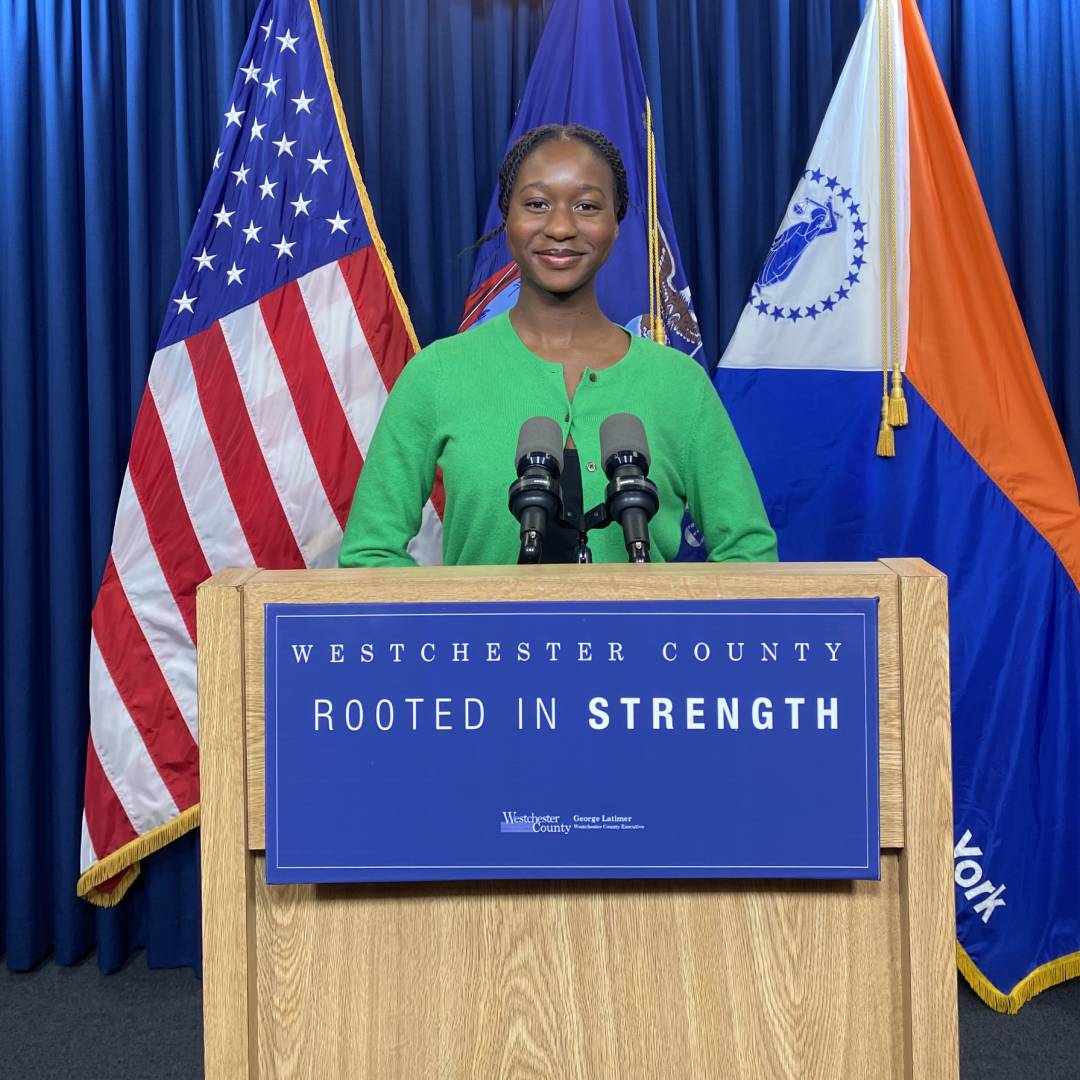
Keyera, who graduated from New Rochelle High School in 2024, is majoring in environmental science at Spelman College in Atlanta. She has assisted Sustainable Westchester in its GridRewards program.
For me, it’s exciting to be a person of color in this field. My neighborhood is near highways and air pollution. When I visit my white friends, they live in and near green spaces and parks. It’s exciting to think I could help create a future that changes that and shifts the playing field. I’ll be at Spelman College, an HBCU, so I’ll be around other Black women, hoping to create change. It’s nerve-wracking but very exciting.
I’m concerned about the future of our climate. The effects of climate change, such as air quality and warming, are evident.
What gives me hope are the groups of younger people who are going out to make a change. They’re making a shift to create a better environment, and we’re taking action on environmental injustice, one step at a time.
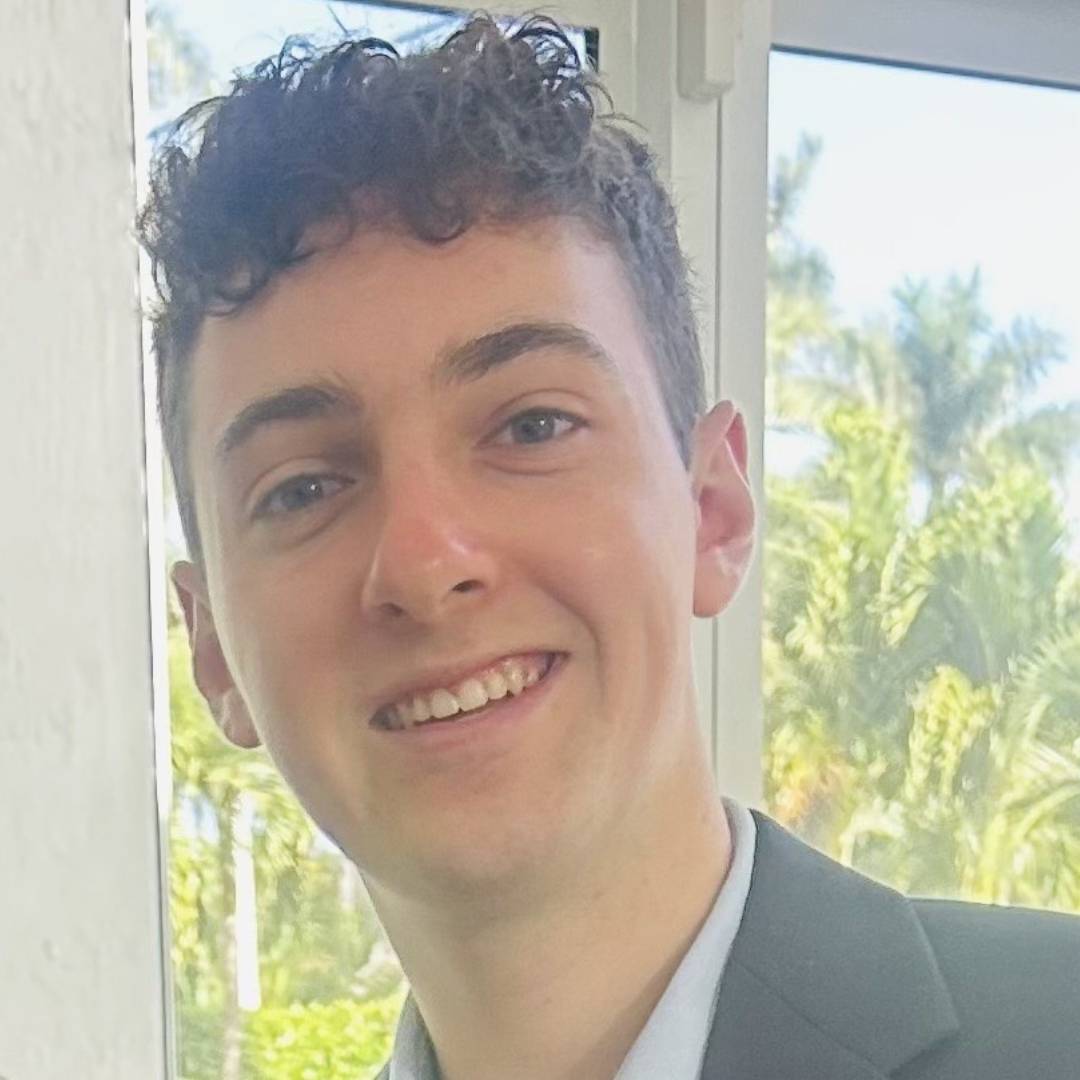
Aidan is a member of the North Castle Sustainability Committee. As the only student member, I’ve acted as a liaison to the school community. In 2023, the committee implemented town-wide composting through a Westchester County-sponsored program, which offers cost savings due to a reduction in waste removal.
Meet Aidan Schissler
When Sustainable Westchester approached our committee to promote GridRewards to North Castle residents, I thought about bringing it to our school district. I loved the idea of pursuing a sustainability initiative in our community that also produces cost savings.
I asked Dr. Jennifer Laden, one of my Global Scholars teachers, to meet with Lauren Brois from Sustainable Westchester to learn more about the program and determine its potential viability at the district level. We were amazed by the technology, energy efficiency, and potential savings it offered. Dr. Laden and I scheduled our next meeting with John Baxter, the Director of facilities for Byram Hills. He was very receptive, and we set up another meeting with Kelly Seibert, the Assistant Superintendent for Business and Management Services, and Michele Kaufman, Vice President of Business Development and Partnerships, from Logical Buildings, to go over the analysis of possible cost savings in the district. Everyone was on board, and the district lawyers approved it. The Byram Hills School District will now participate in demand response in all their schools.
With GridRewards, I emphasize the economic incentive: Homeowners can make money from this.
For years, I’ve worked on local projects to clean up areas and town-wide composting—many towns in my area have composting, and I wanted to bring it to North Castle.
When I was little, my family always participated in the town cleanup around Earth Day. We’d fill up bags of trash along a half-mile stretch. During Covid, the cleanups stopped. In elementary school, members of the town Sustainability Committee came into our schools and helped us learn about sorting our lunch items into different receptacles, composting, and recycling trash. That inspired me.
Moving forward, I want to focus on sustainability and business. My family owns a bakery called Sugar Hi. Every week, they go through hundreds of eggs and banana peels. Since all of it went in the trash, I wanted them to start composting. Now, they’re open to composting all of it. That was one instance where I tried to bring business and sustainability together.
I’m very concerned with the direction in which everything is heading. The bigger issue is that many people don’t believe the earth is warming and don’t know about sustainable practices either. It’s a huge concern.
There’s hope because more programs like GridRewards focus on sustainability. There’s also more awareness of combating climate change. If we all play our part and do what we can, this could lead to real change. Profit can be aligned with purpose.
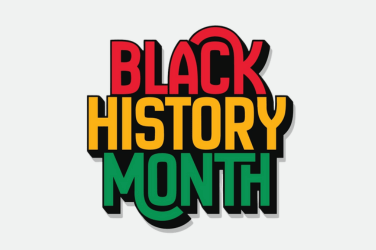
As Black History Month comes to an end, we want to shine a light on Black leaders who are driving environmental justice forward. These changemakers are fighting for clean air, safe water, climate action, and equitable access to green jobs in communities that have been historically overlooked.
Black communities have always been at the forefront of environmental justice—from advocating against toxic pollution in cities to leading the transition to clean energy and sustainable economies. Today, we recognize four incredible leaders who are making real change happen.
Andre Peart – Creating Pathways for Economic Justice
Andre Peart is the Founder & CEO of Untapped Solutions, a company using technology to help formerly incarcerated individuals find jobs and career opportunities in clean energy and beyond.
Many Black and Brown individuals face barriers to employment due to systemic injustice. Andre is breaking down those barriers by connecting justice-impacted individuals with training programs and workforce development opportunities.
Through his work, he is helping build economic justice and create lasting change in Black and underserved communities.

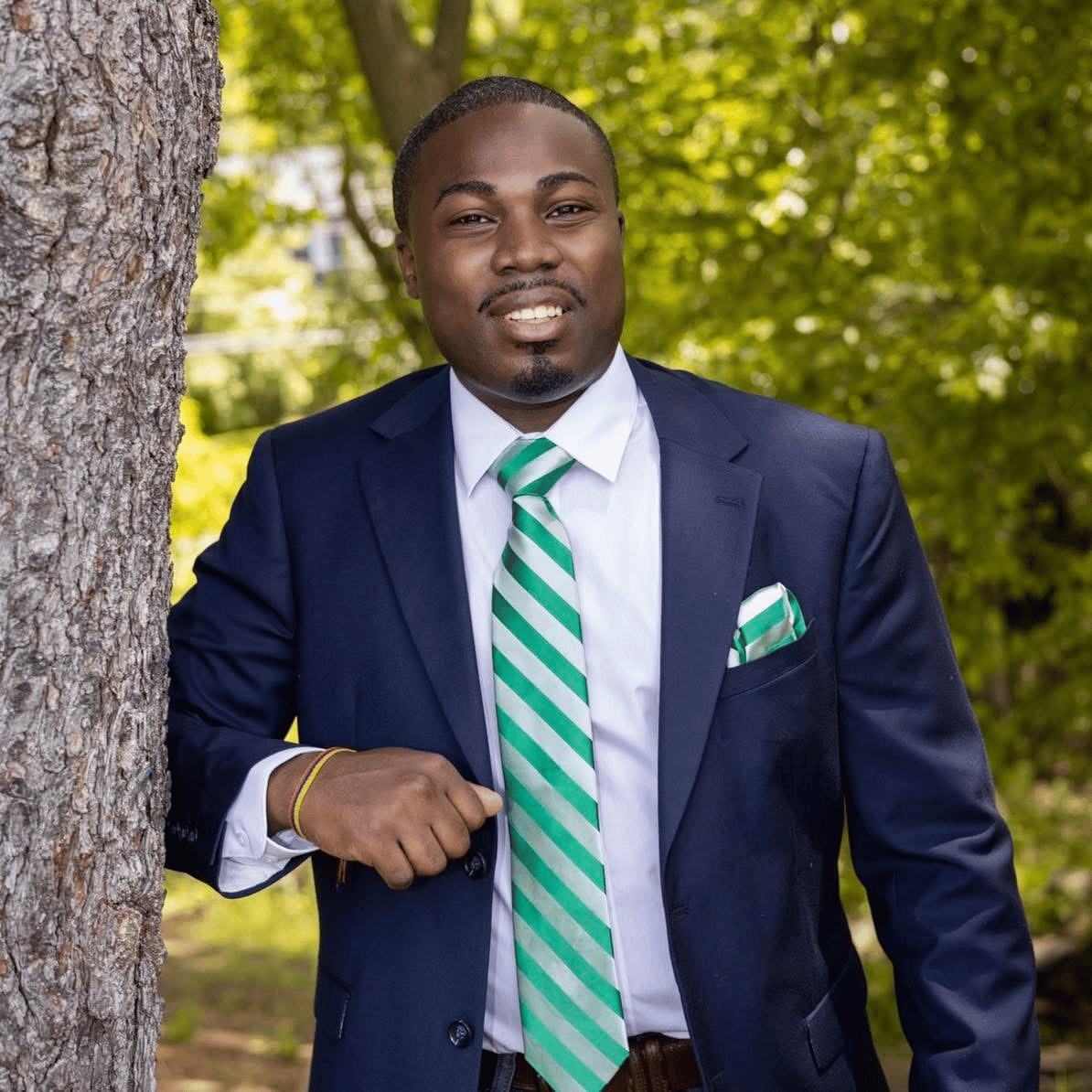
Paul Presendieu – Leading Local Climate Action
As the Chair of the City of New Rochelle’s Ecology and Natural Resources Advisory Committee, Paul Presendieu is making sure that Black and immigrant communities have a seat at the table in climate policy.
Paul has also served as a United Nations Ambassador for Climate Action, where he has worked to ensure that climate solutions include equity and justice. His leadership has been recognized by the Clinton Global Initiative and Grist, who named him one of the top 50 Climate Leaders to Watch in the U.S.
His work is proof that climate leadership must reflect the diversity of our communities.
Paul Presendieu | LinkedIn
Peggy Shepard – A Pioneer in Environmental Justice
Peggy Shepard is a trailblazer in the environmental justice movement. As the Co-founder and Executive Director of WE ACT for Environmental Justice, she has spent decades fighting for clean air, water, and environmental protections for Black and Brown communities.
She has served as a leader at the White House Environmental Justice Advisory Council and the EPA’s National Environmental Justice Advisory Council. Her work has forced government agencies and corporations to take environmental racism seriously.
She is proof that community activism can change national policy.
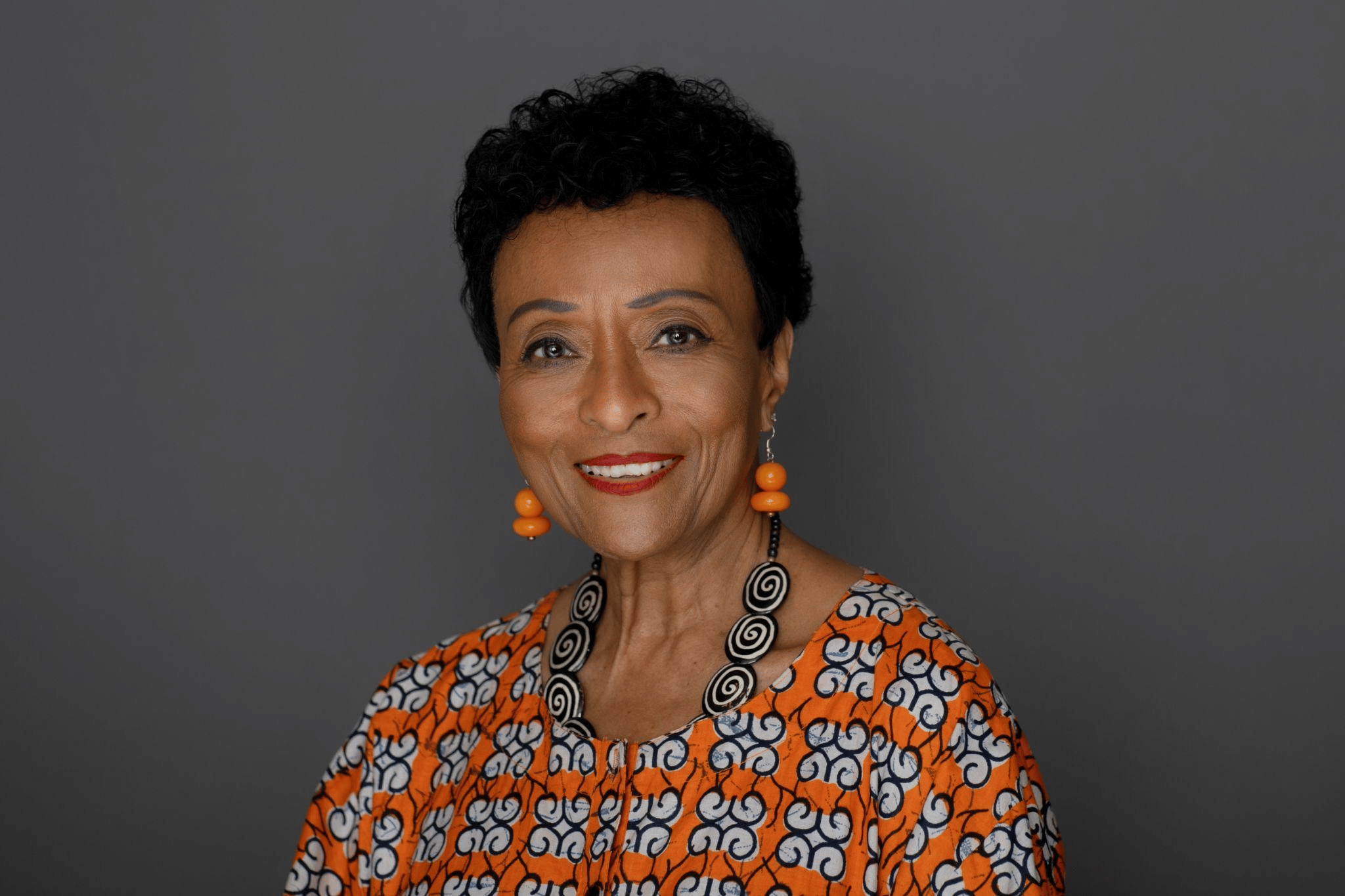
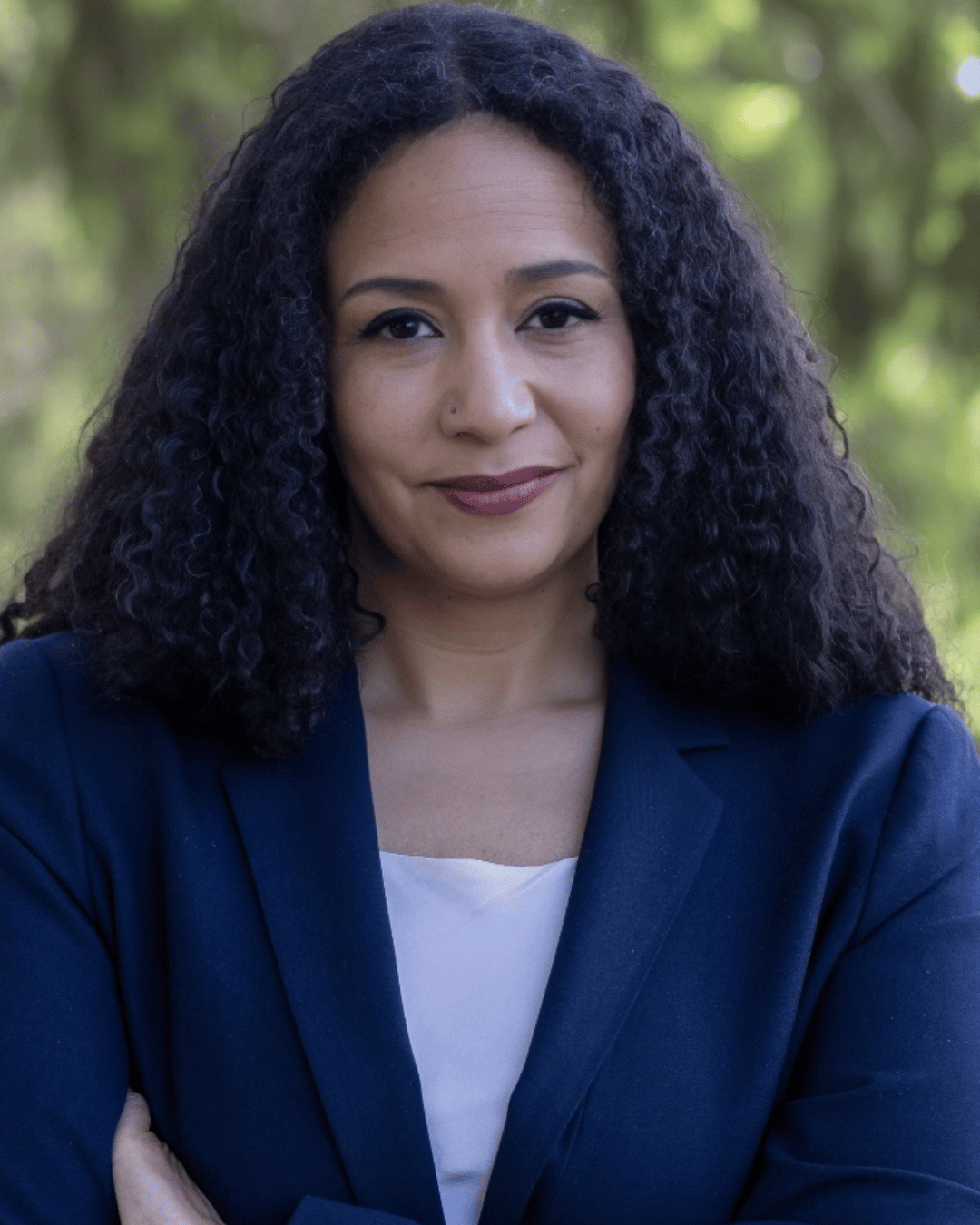
Raya Salter – Fighting for Energy Justice
Raya Salter, also known as “Climate Auntie,” is a passionate advocate for clean energy and environmental justice. As the Founder and Executive Director of the Energy Justice Law & Policy Center (EJLPC) in New Rochelle, NY, she is building grassroots power and youth leadership for a just energy transition.
With over 15 years of experience in energy law, Raya has worked to ensure that Black and frontline communities have a say in climate policy. She is a member of the New York State Climate Action Council and has testified in Congress, where she fearlessly challenged big oil interests.
Her work reminds us that climate solutions must be rooted in racial and economic justice.
At Sustainable Westchester, we are committed to highlighting Black leaders, advocates, and changemakers who are driving the clean energy transition forward. Their work is essential to ensuring a just and equitable transition—one where all communities have access to clean air, water, affordable energy, and green job opportunities.
The path to a clean energy future must be built on equity, inclusion, and justice. We will continue to support, amplify, and stand alongside Black voices leading the way in environmental justice—not just during Black History Month, but every day.
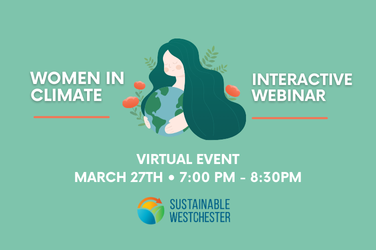
Location: Virtual
Date: Thursday, March 27, 2025
Time: 7:00 PM – 8:30 PM
Registration: bit.ly/WomenInClimate
In celebration of Women’s History Month, Sustainable Westchester will host a free interactive Women In Climate webinar. Women who desire to stand united in our commitment to protect the planet, please join us for this virtual panel discussion. Let us share our personal connections with the Earth and unveil solutions that will enrich our community and nurture our planet. The evening will include a panel discussion, Q&A, and an opportunity to form new connections.
Questions? Contact [email protected]
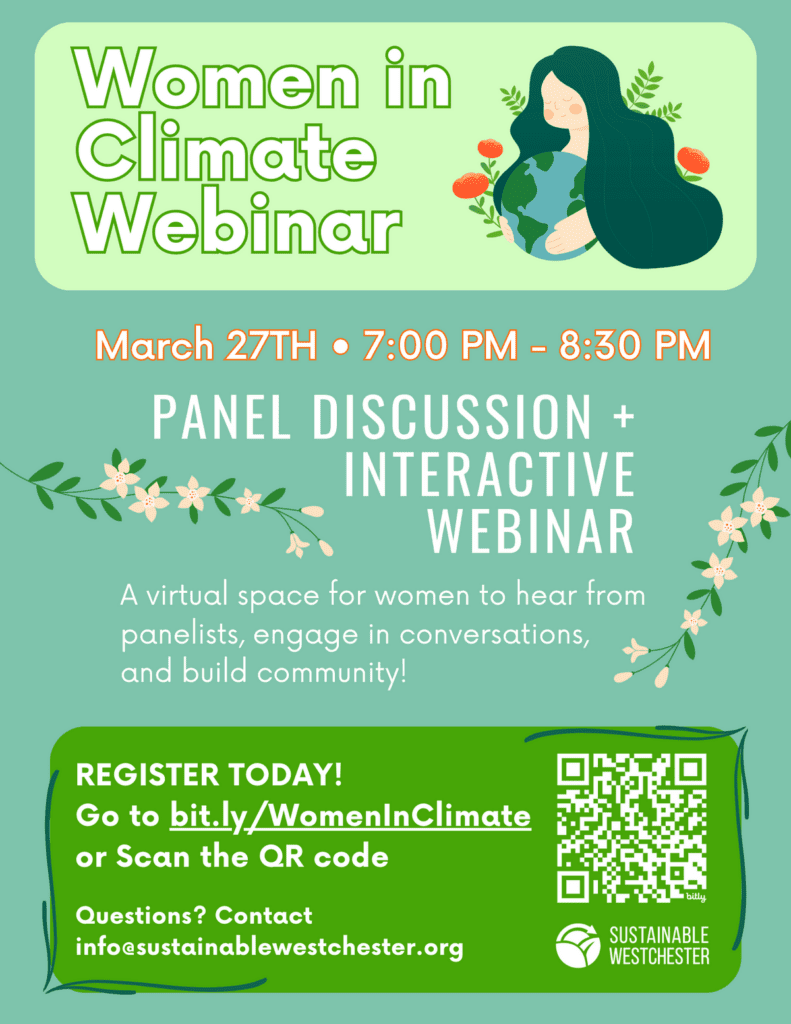
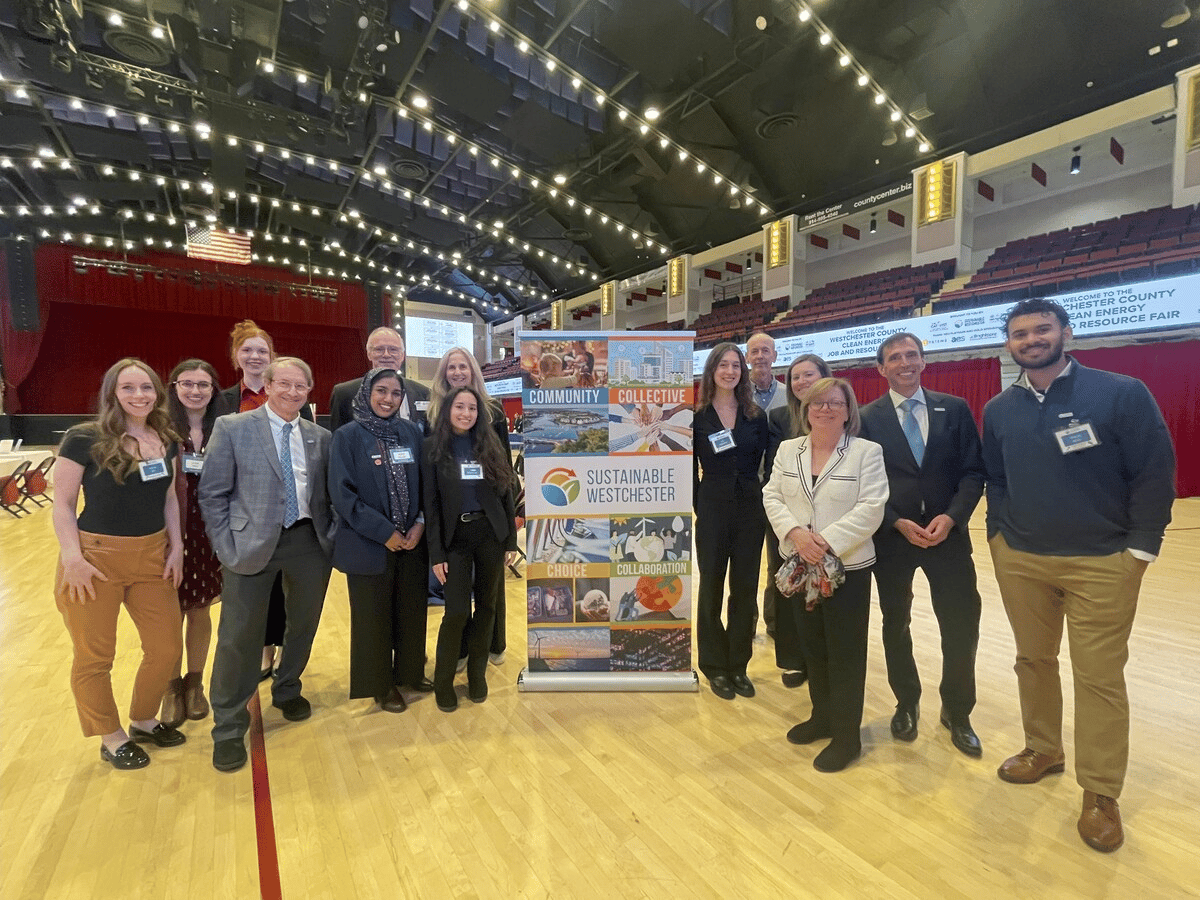

On November 19, 2024, the Westchester County Office of Economic Development and Sustainable Westchester co-hosted the Westchester County Clean Energy Job and Resource Fair. The event attracted an impressive crowd of over 325 job seekers, all eager to explore opportunities in the rapidly expanding clean energy sector. This fair was more than just a gathering; it was a powerful demonstration of our commitment to fostering sustainable energy careers and empowering residents to join the movement toward a greener future.
Attendees had the chance to meet directly with top clean energy employers, including companies specializing in solar energy jobs, heat pump installations, and geothermal technologies. In addition to networking with hiring managers, participants connected with clean energy training providers offering pathways to high-paying clean energy careers. This combination of employer engagement and training resources provided a comprehensive approach to helping individuals secure meaningful roles in the renewable energy industry.
The event offered a variety of support services to enhance the job-seeking experience. Participants benefited from resume-writing assistance, personalized job-matching services, and interactive workshops designed to help attendees stand out in the competitive renewable energy jobs market. A panel discussion, titled “Jumpstarting Your Clean Energy Career,” featured industry leaders sharing valuable insights into the clean energy job market, while the “Conversation with an Expert” session provided practical advice for navigating the transition into sustainable energy careers.
Our commitment to equity and inclusivity was reflected in both the planning and execution of the event. By partnering with key community-based organizations—such as New Yorkers for Clean Power, the Re-Entry Task Force, municipal housing authorities, libraries, and other resource groups—we ensured the event reached a broad audience. Extensive community outreach helped engage youth, women, people of color, justice-affected individuals, veterans, immigrants, and members of historically disadvantaged communities. This deliberate focus on diversity highlighted the importance of building an inclusive workforce to drive the clean energy transition.
The fair also emphasized the financial and environmental benefits of careers in renewable energy. Attendees discovered how working in fields such as solar panel installation, energy efficiency consulting, and geothermal heating and cooling contributes to a cleaner, healthier planet while offering stable and rewarding employment. With roles ranging from entry-level clean energy jobs to specialized positions like energy analysts and renewable energy engineers, the opportunities showcased at the event reflected the broad scope of Westchester’s burgeoning green economy.
Our innovative approach to fostering community engagement and workforce development underscores the pivotal role we play in the clean energy transition. By hosting events like the Clean Energy Job and Resource Fair, we continue to inspire action, create awareness, and equip residents with the tools needed to thrive in the renewable energy industry.
As the clean energy sector continues to grow, events like these are essential in preparing Westchester County for a future powered by sustainable energy. Together with partners and residents, we are charting a path toward an inclusive, resilient, and clean energy workforce—one that reflects the diverse communities we serve.
